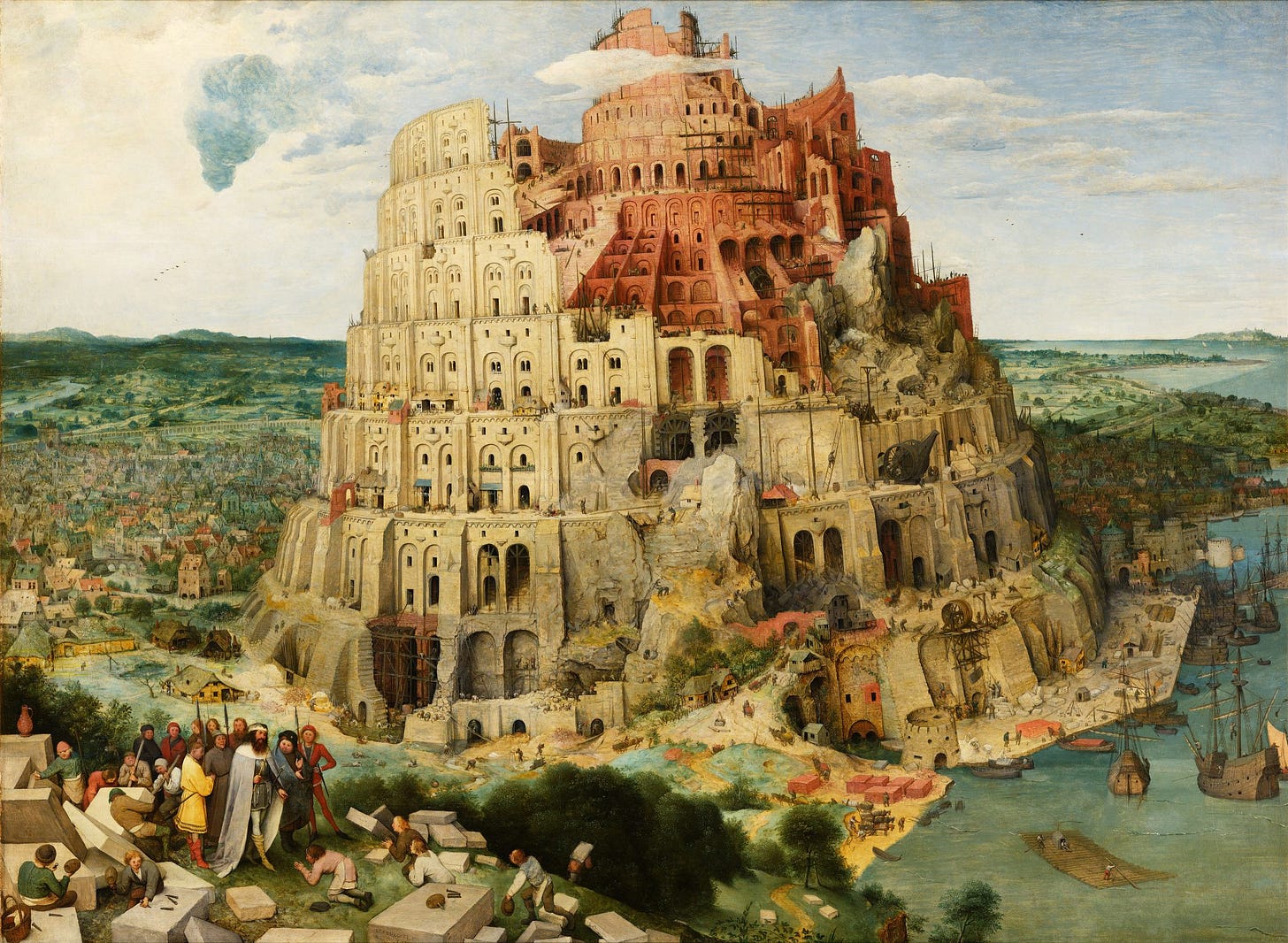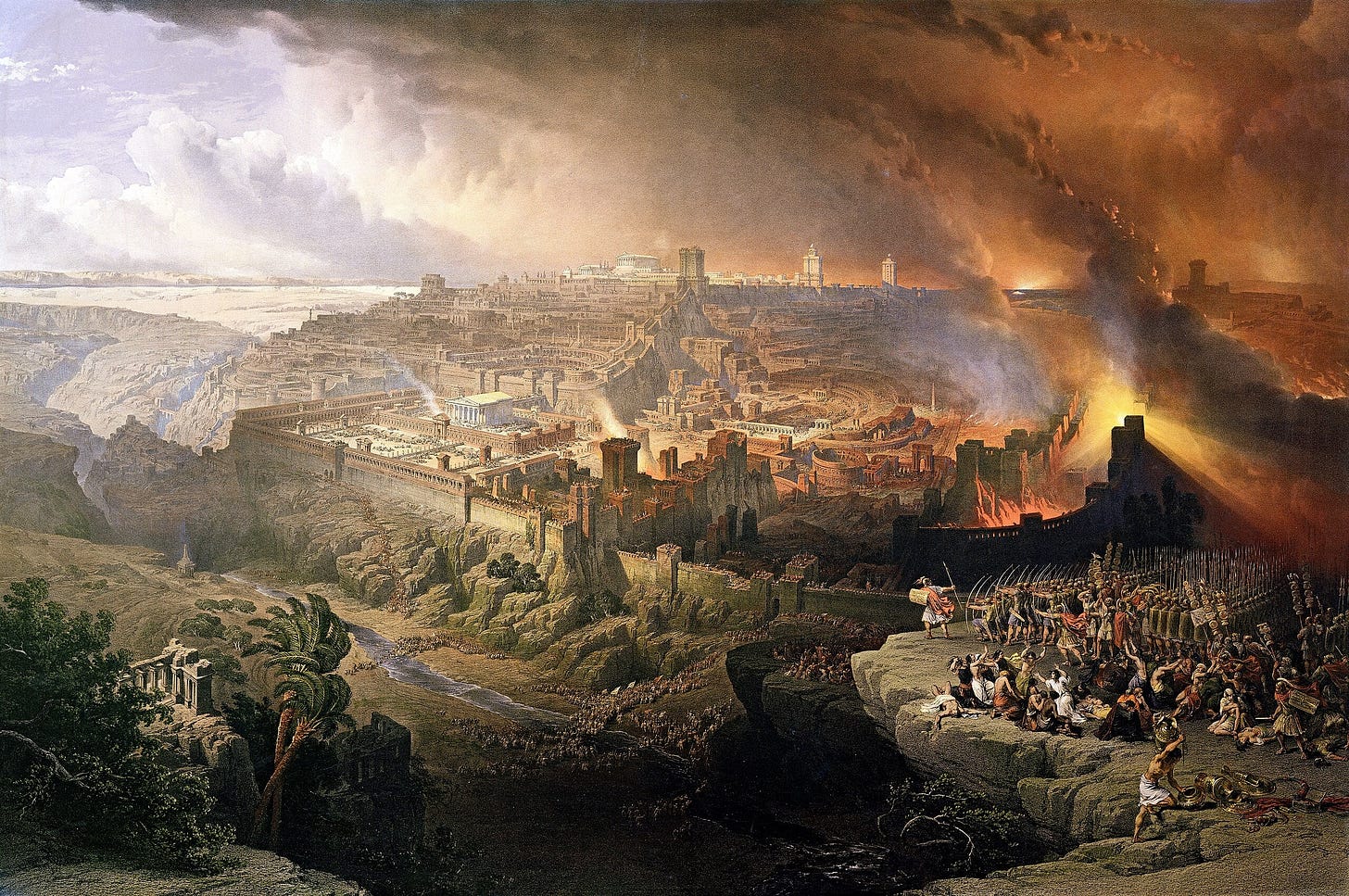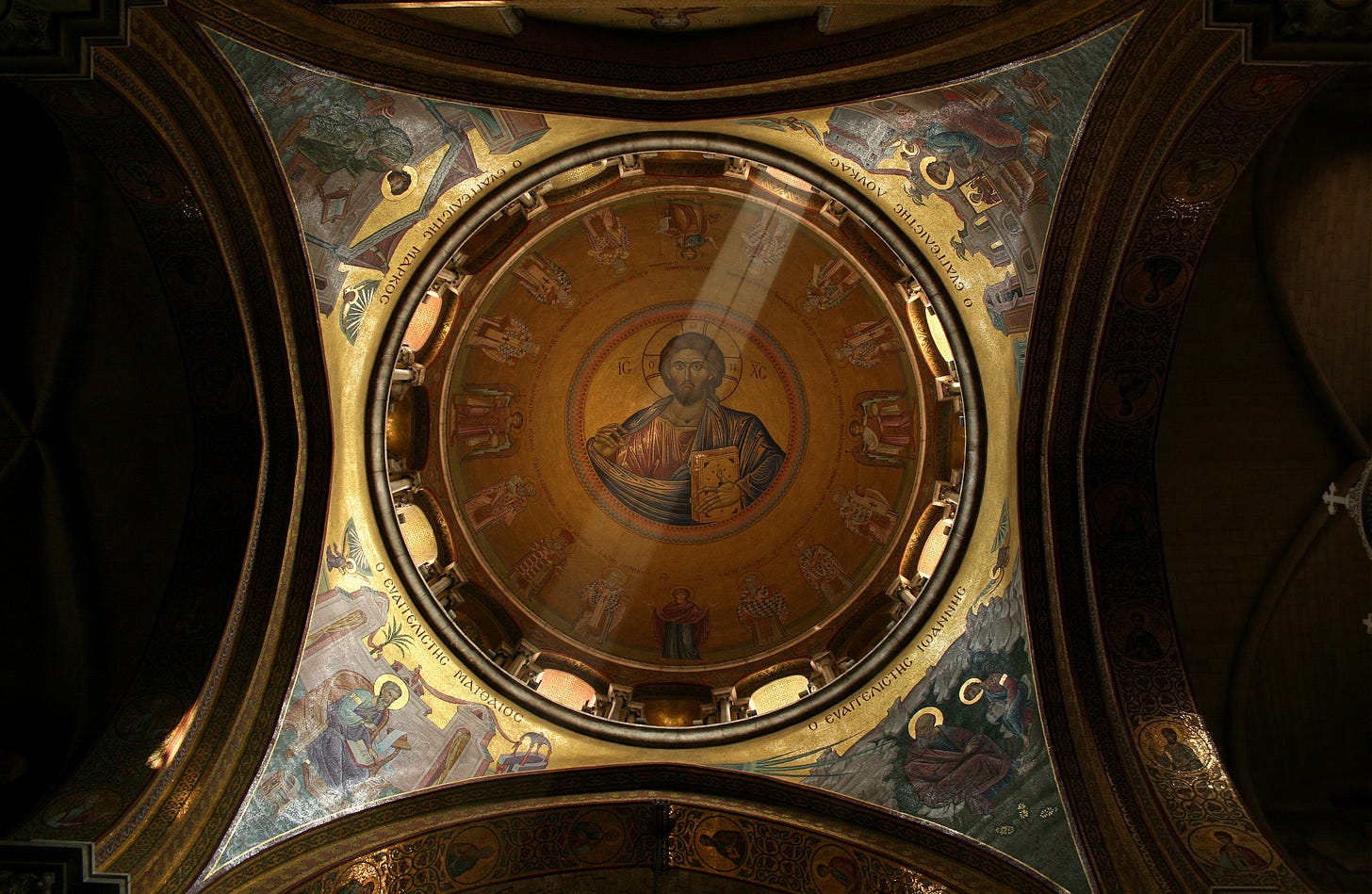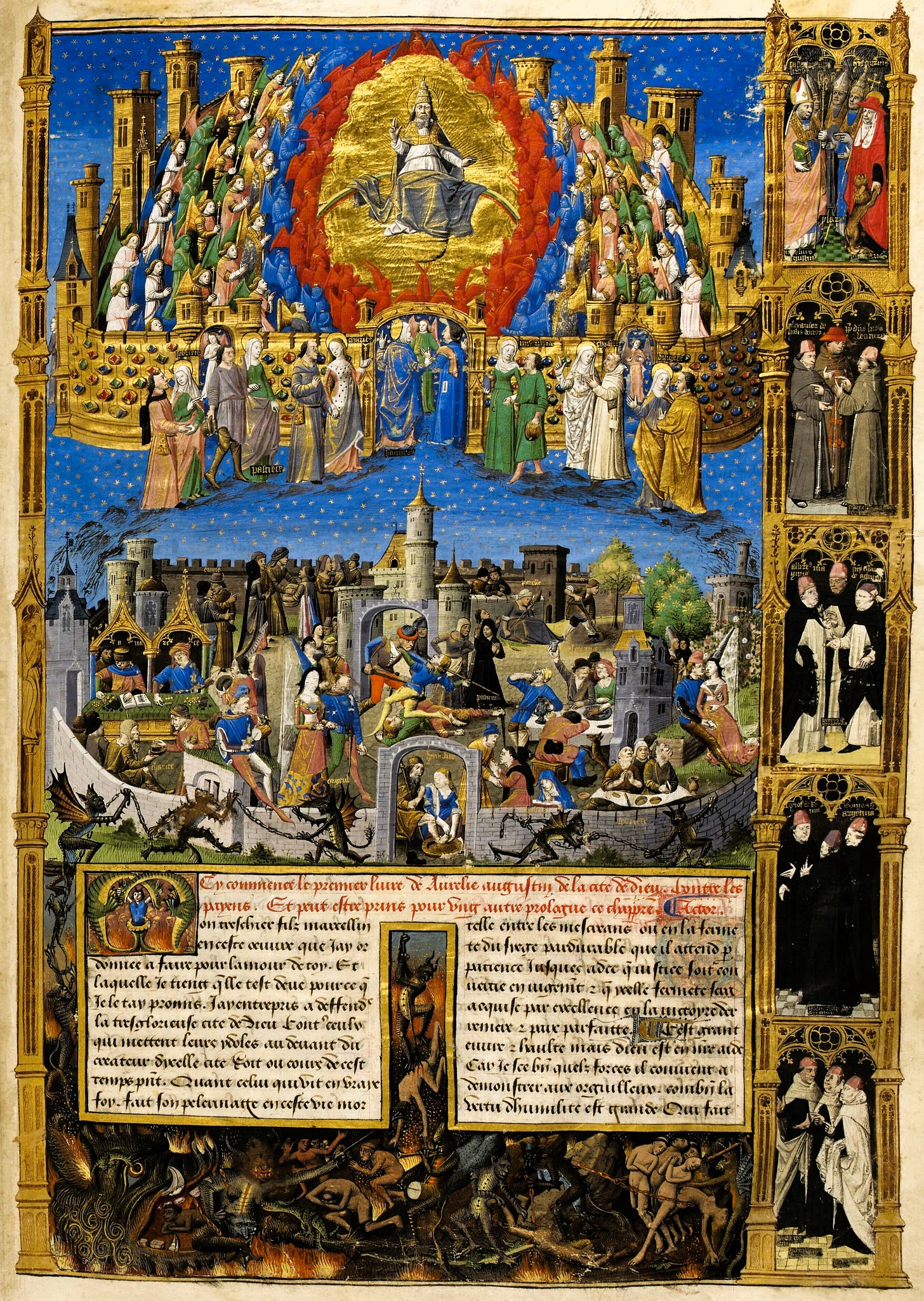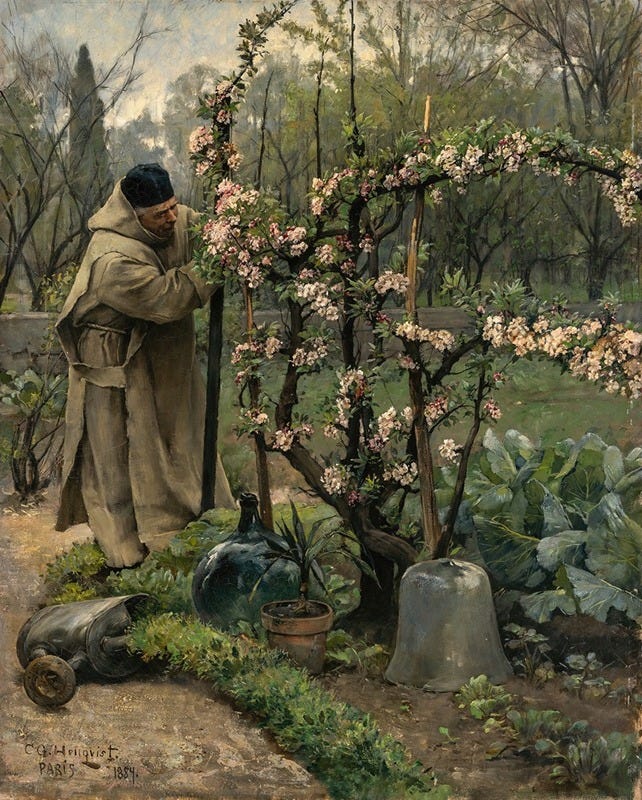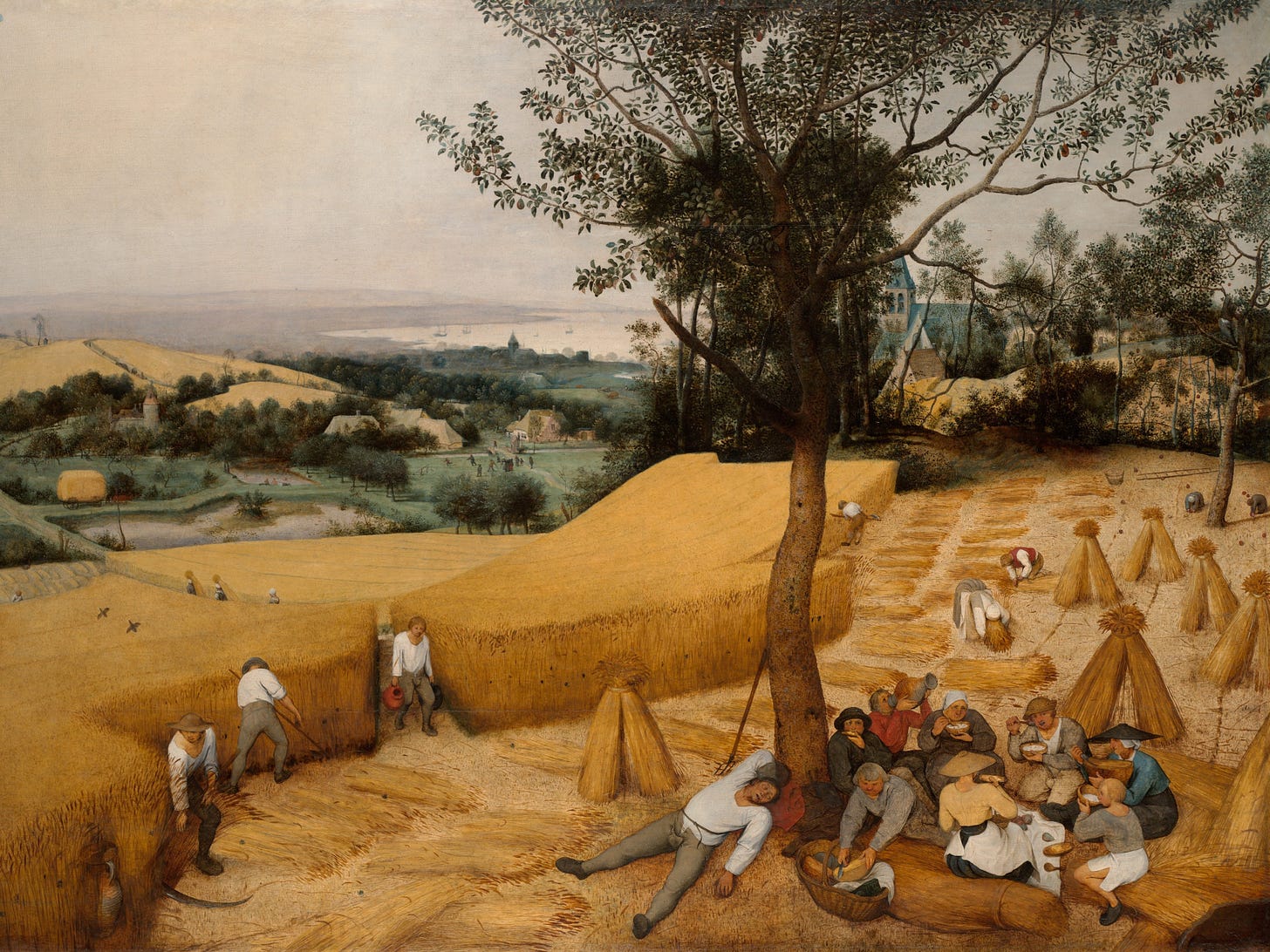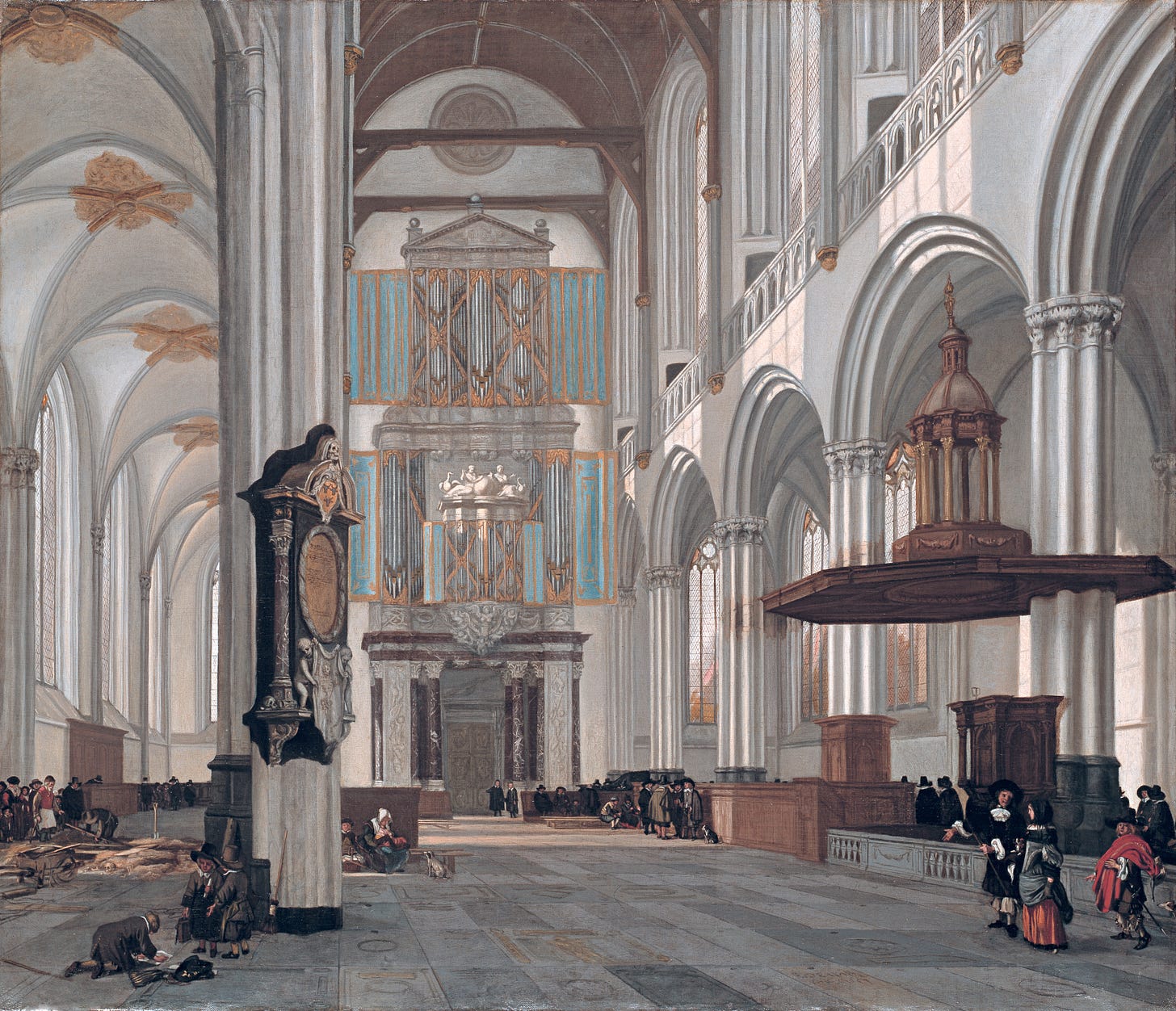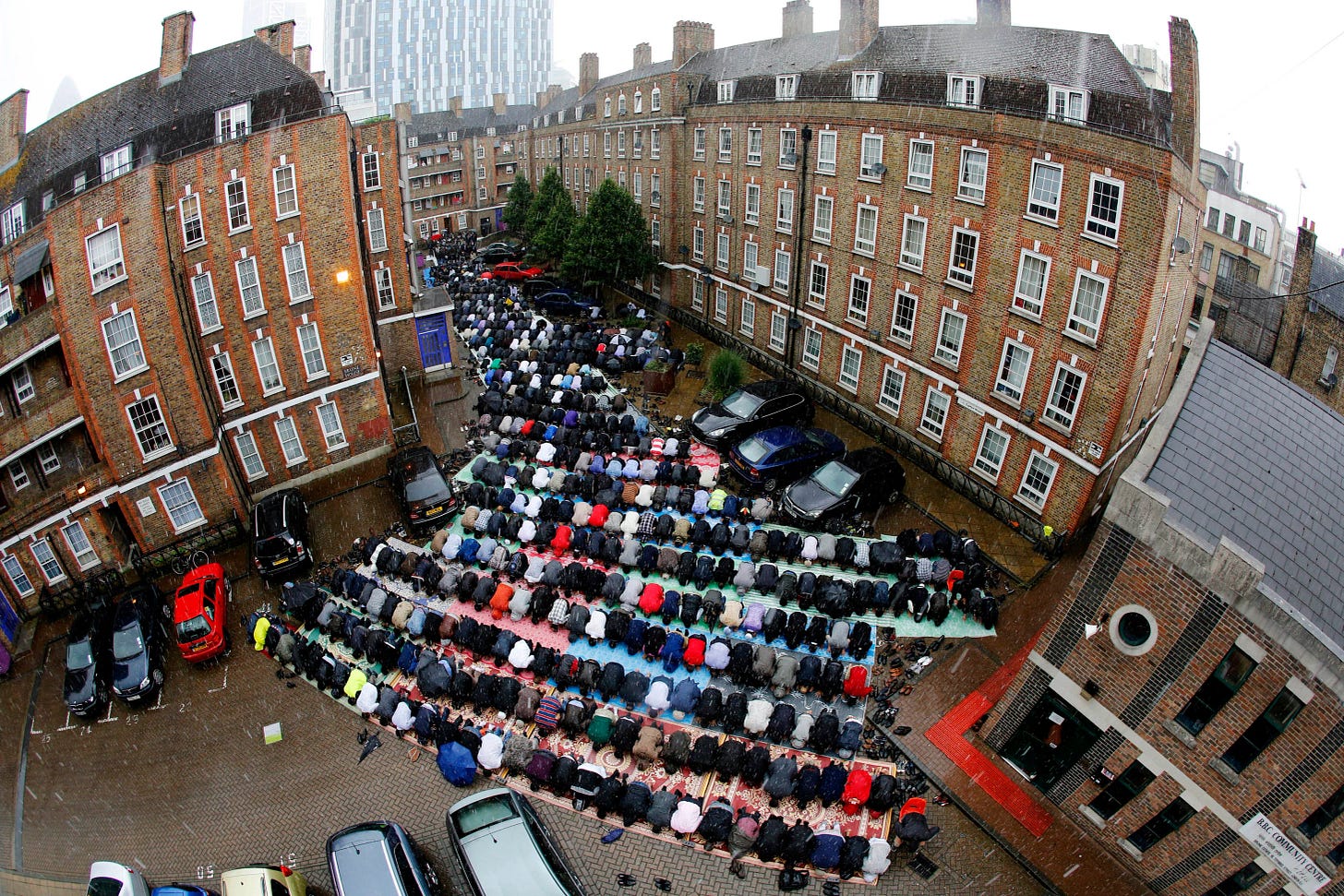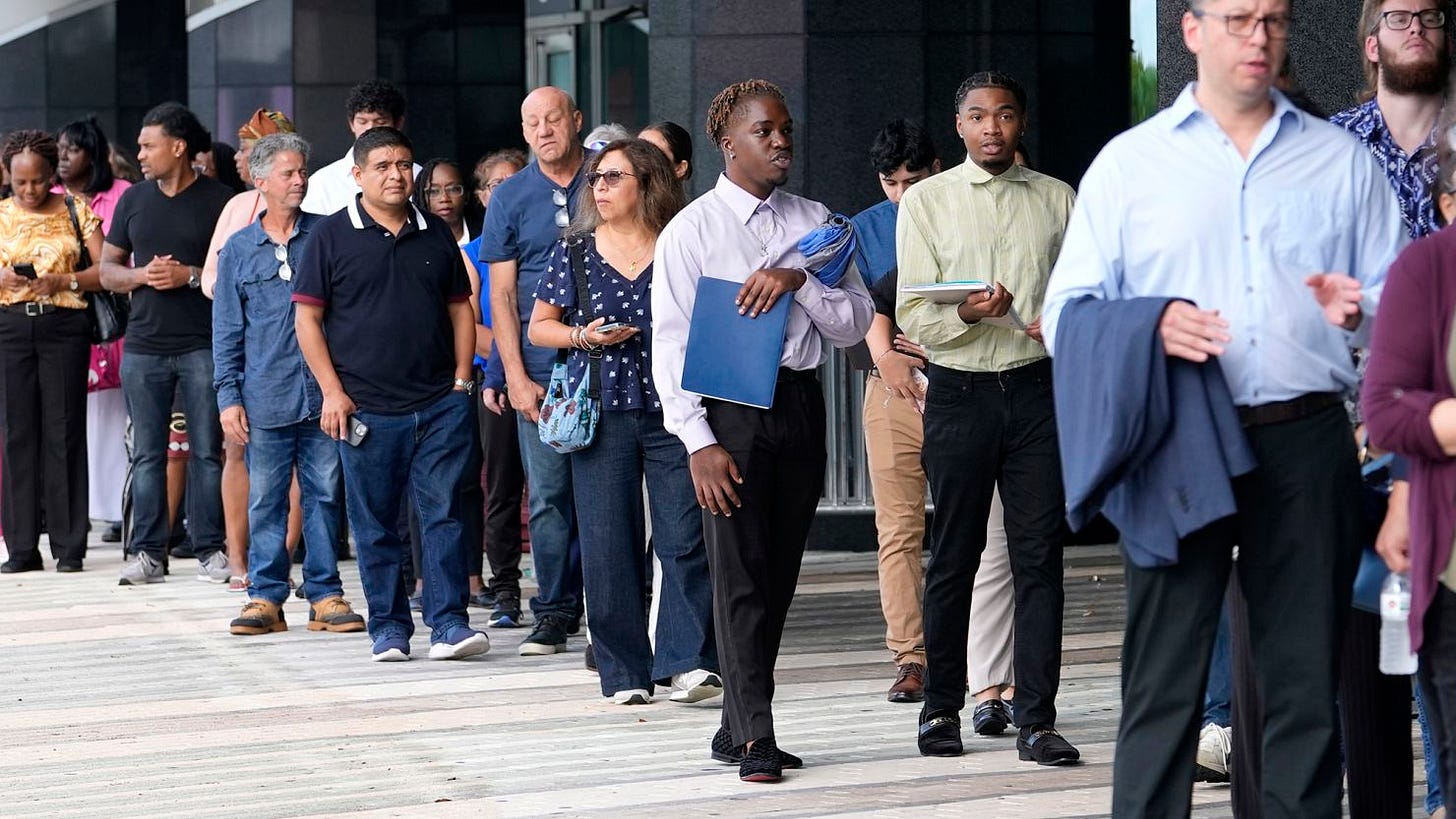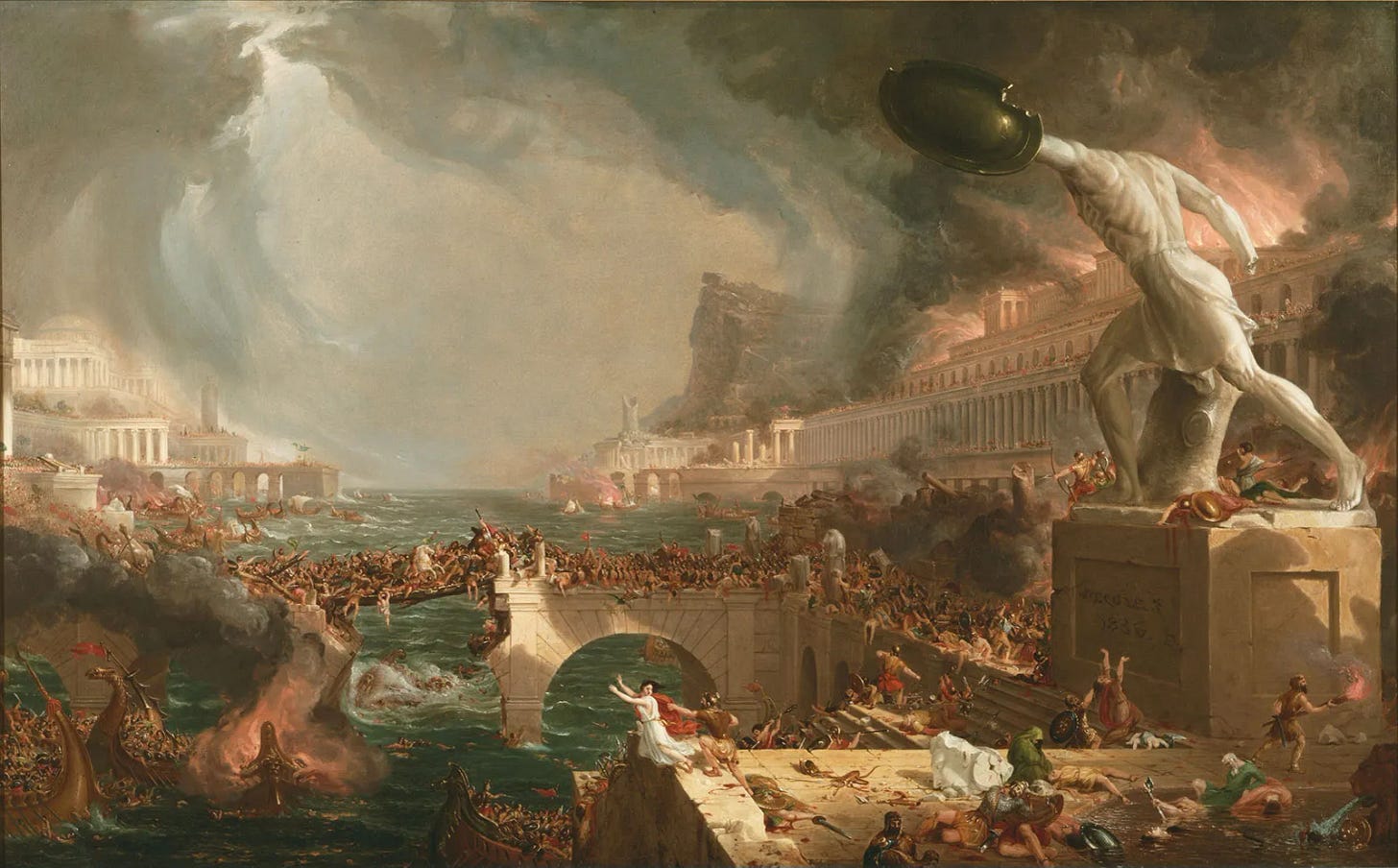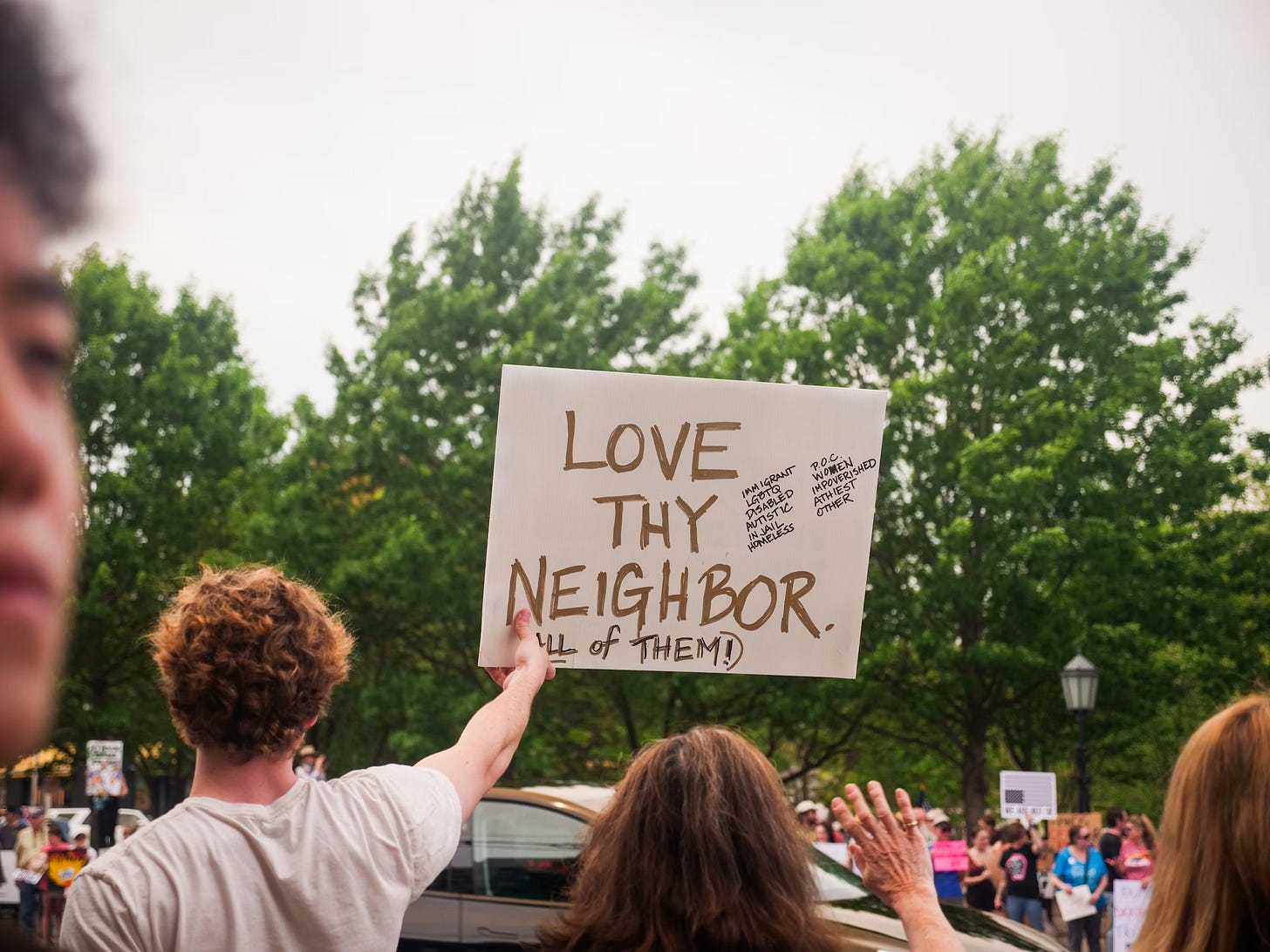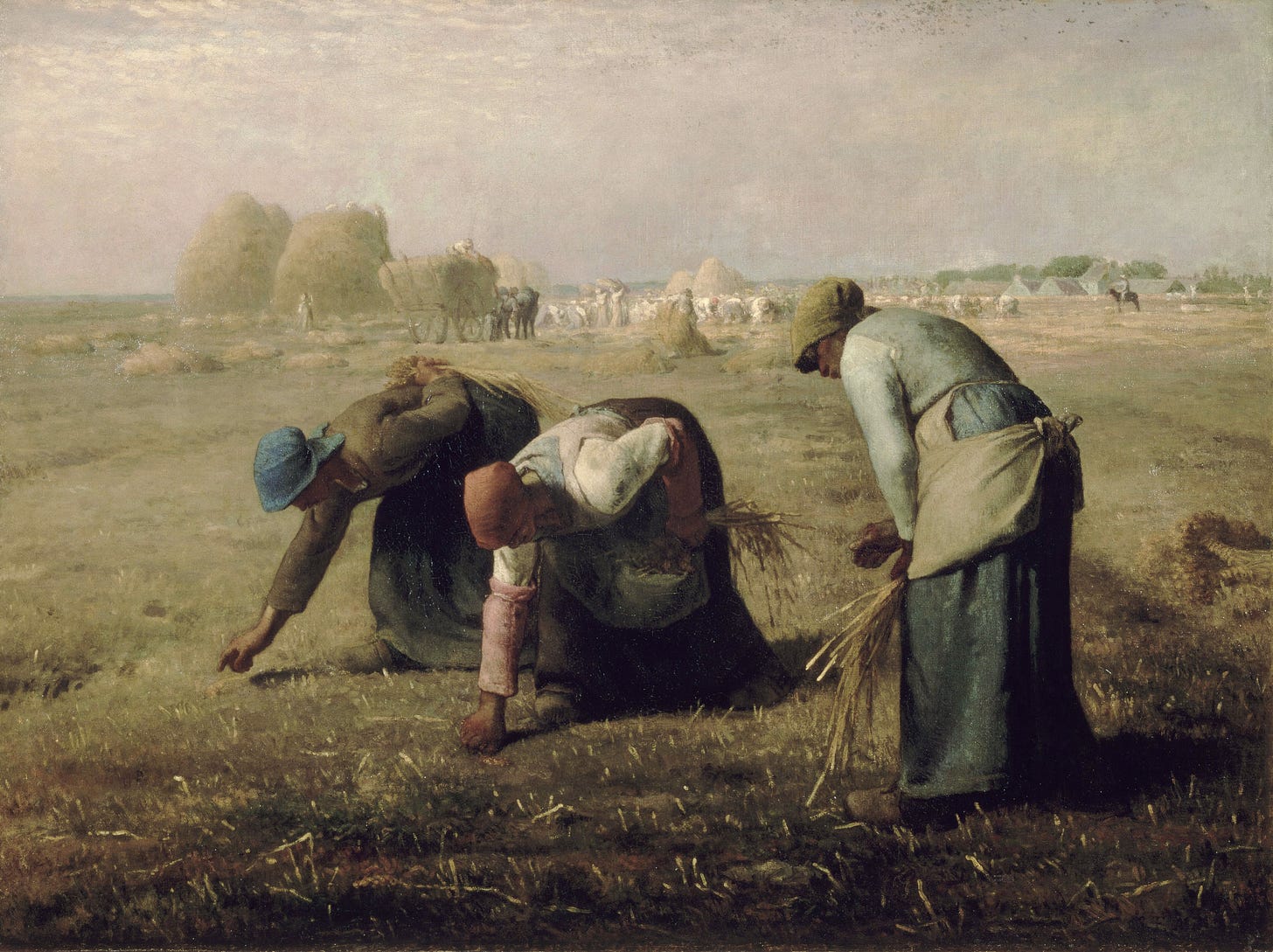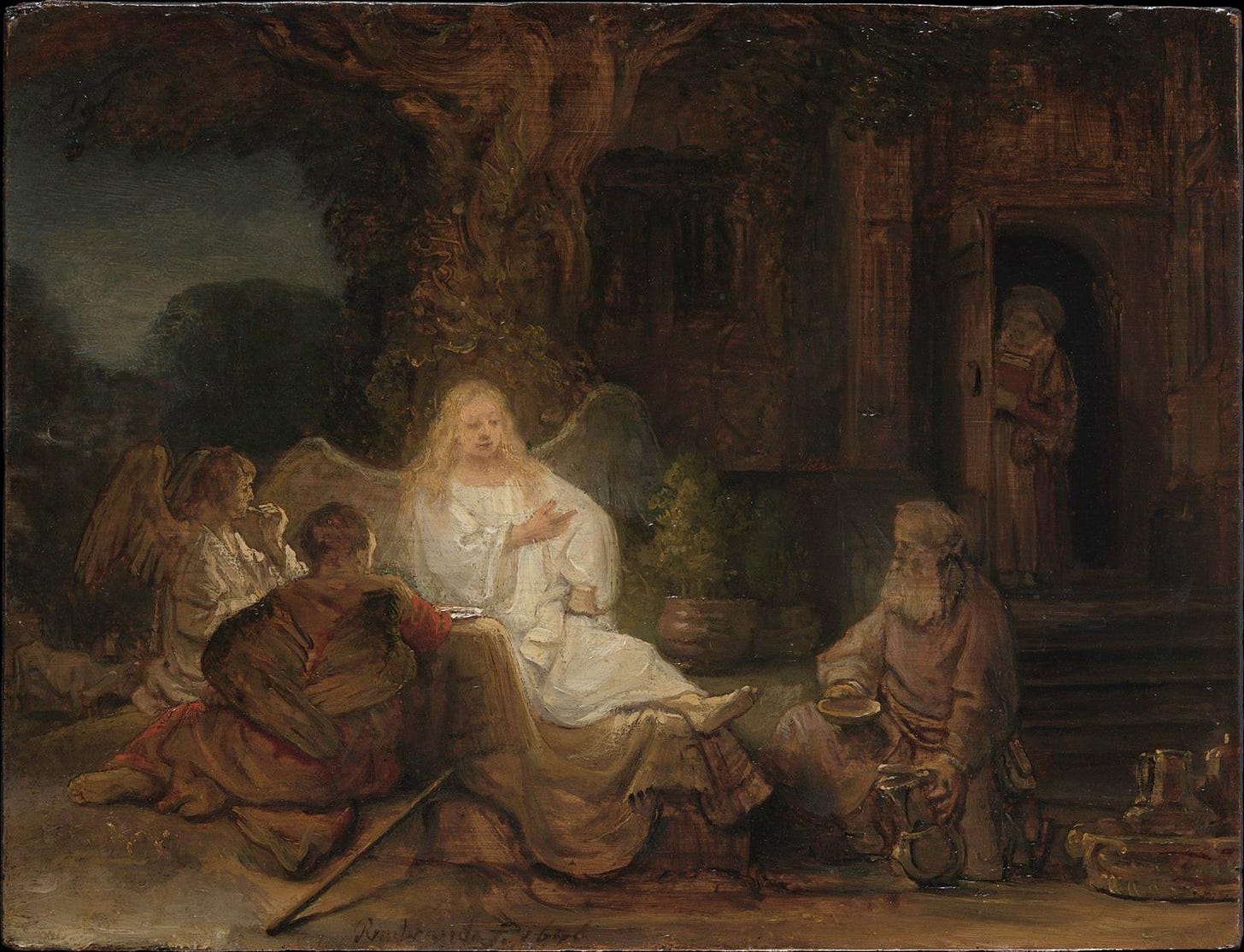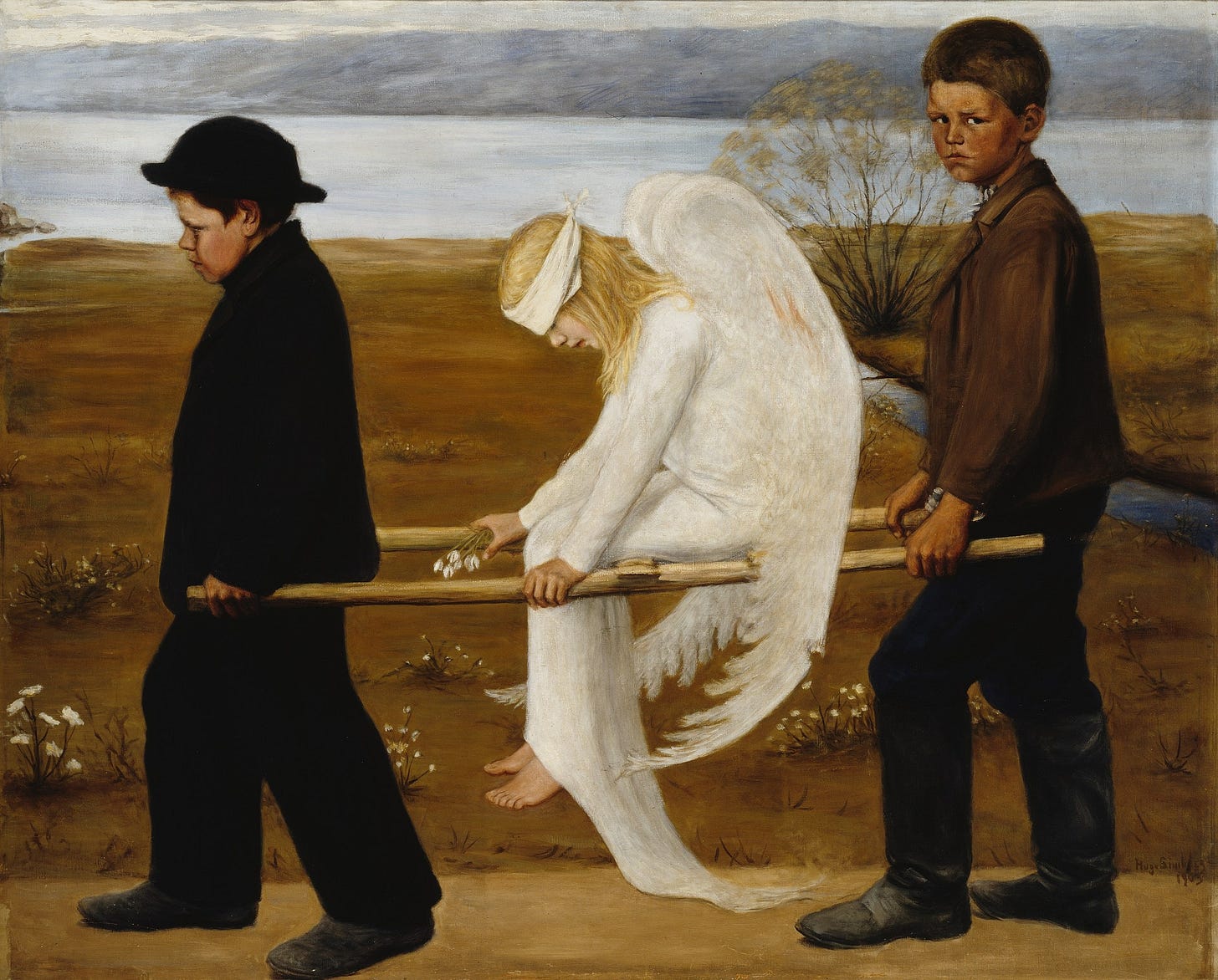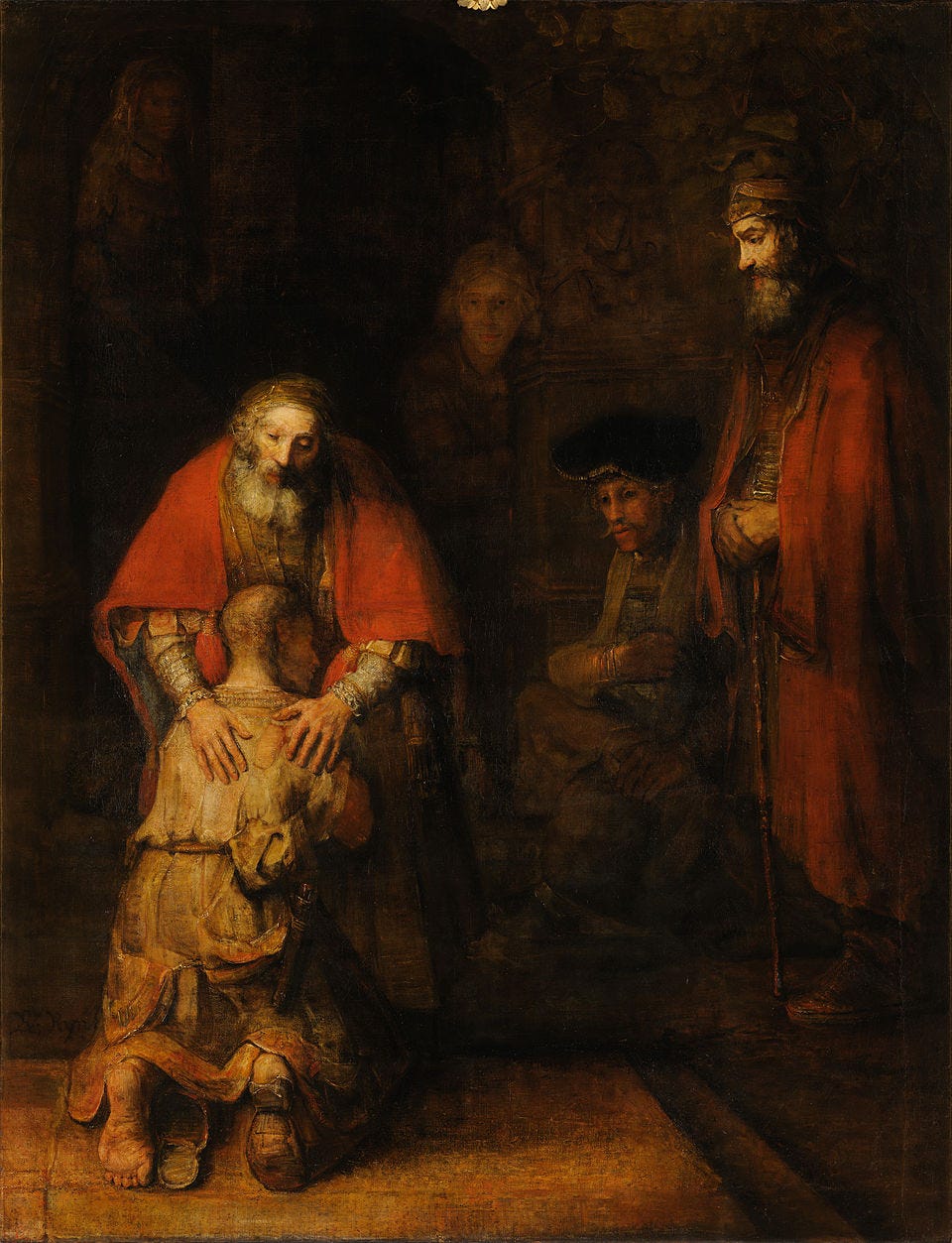No, Christianity Doesn't Require National Suicide
A Christian defense of national sovereignty against the globalist push for mass migration.
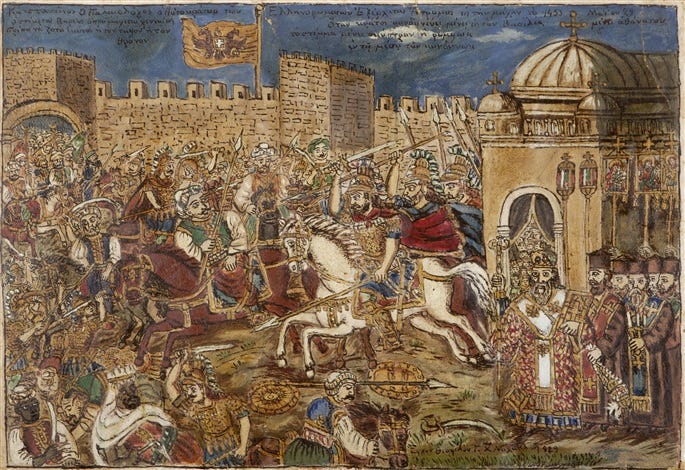
The West today (i.e. Christendom) faces a profound unraveling of borders, of belonging, and of belief. From the southern border of the United States to the migrant camps across Europe, millions cross into nations not as guests, but as claimants, often illegally, frequently in defiance of law, custom, and culture. Meanwhile, political elites and religious leaders insist that Christianity demands it. That love of neighbor and compassion require open borders. That resistance to mass immigration is somehow unchristian or even heretical.
This is false.
Christianity affirms compassion, but not chaos. Mercy, not madness. The Biblical and Patristic tradition upholds the dignity of nations, the rule of law, and the duty to one’s own people. The Reformers reinforced this vision by emphasizing covenantal responsibility, civil order, and the moral limits of state power. This essay presents a Christian case—drawn from Scripture, the Church Fathers, and moral tradition—for national sovereignty and ordered hospitality, and against the globalist push for both legal mass and illegal migration.
I. The Biblical Theology of Nations and Borders
It’s fashionable in modern Christian circles to moralize immigration policy by appealing vaguely to superficial notions of compassion and hospitality. But the Bible isn’t a pamphlet for sentimental humanitarianism. It’s a revelation of divine order. And from Genesis to Revelation, Scripture affirms the legitimacy of nations, their divine origin, and their moral necessity.
God Created Nations, Borders, and Boundaries
The first truth modern Christians must recover is this: nations are not arbitrary human constructs. They’re the result of divine will.
In Deuteronomy 32:8, we read:
“When the Most High gave to the nations their inheritance, when He divided mankind, He fixed the borders of the peoples according to the number of the sons of God.”
Though it may echo the language of national pride, it’s a theological statement: God apportioned peoples to lands, set their boundaries, and established their limits. Borders, in other words, are not a concession to sin. They’re part of the moral architecture of the world.
The Apostle Paul reaffirms this in Acts 17:26 while preaching to the pagan Athenians:
“And He made from one man every nation of mankind to live on all the face of the earth, having determined allotted periods and the boundaries of their dwelling place.”
The modern liberal imagination sees borders as fences to tear down. Scripture sees them as boundaries God Himself ordained.
This doesn’t mean every modern state has God’s seal of approval. But it does mean that the concept of distinct nations dwelling in defined lands isn’t contrary to God’s will. In fact, it’s a reflection of it.
The rejection of borders is the rejection of stewardship.
In Genesis, Adam isn’t given everything. He’s given a bounded garden to tend and protect. A borderless society isn’t open-handed; it’s negligent. It represents a refusal to govern.
Christians who seek to dissolve these distinctions in the name of globalism aren’t furthering the Kingdom of God. They’re rebelling against its ordering.
Babel and the Sin of Globalism
If nations are a divine gift, then attempts to erase them aren’t just foolish—they’re blasphemous. The Tower of Babel is the Bible’s warning against imperialistic homogenization.
At Babel, mankind, still united in language and purpose, seeks to build “a city and a tower with its top in the heavens,” in order to “make a name for ourselves” (Genesis 11:4). More than just an architectural project, it’s an attempt to consolidate humanity into a single order, a political-religious monoculture without God.
The Tower of Babel is the first globalist project.
The tower is man’s rebellion against limits: national, cultural, and vertical. And God’s response isn’t a gentle correction. He divides us:
“‘Come, let us go down and confuse their language, so that they may not understand one another’s speech.’ So the Lord dispersed them from there over the face of all the earth, and they left off building the city.”
— Genesis 11:7-8
God scatters them, but this isn’t a punishment for unity. Instead, it’s because their unity was against His command to spread and form distinct peoples. What we’re left with is the divine institution of diversity. Not the kind celebrated in college brochures, but a diversity of nations and languages as a restraint against tyranny. Political and cultural uniformity, when cut off from God, leads to oppression instead of peace.
The judgment of Babel is also a mercy: it breaks man’s capacity to centralize evil and halts the machinery of man’s self-worship.
In today’s context, globalism (the uncritical celebration of open borders, mass migration, and planetary governance) recapitulates the sin of Babel rather than the miracle of Pentecost. It creates confusion in lieu of communion.
And although progressive churches embrace this new tower-building religion, it must be met with the same divine resistance.
Biblical Hospitality: Conditional and Contextual
Proponents of open borders often cite verses about “welcoming the stranger,” particularly Leviticus 19:34:
“You shall treat the stranger who sojourns with you as the native among you, and you shall love him as yourself.”
But this command has context. In the Hebrew, the word used here for stranger is ger—not a transient foreigner, but a resident alien who lives peaceably within Biblical Israel, accepts its laws, and participates in its religious life.
As the law states in Numbers 15:15–16:
“For the assembly, there shall be one statute for you and for the stranger who sojourns with you […] You and the sojourner shall be alike before the Lord. One law and one rule shall be for you and for the stranger who sojourns with you.”
The sojourner isn’t a lawbreaker or a member of a parallel society. He’s an integrated foreigner, expected to live as one of the people. There’s no room in Biblical Israel for multiculturalism in the modern sense. There’s hospitality, but it’s an ordered hospitality that preserves the moral and spiritual unity of the host nation.
Moreover, this hospitality is selective. The Mosaic law explicitly excludes and limits certain foreign nations from full civic inclusion:
“No Ammonite or Moabite may enter the assembly of the Lord; even to the tenth generation.”
— Deuteronomy 23:3
In other words, the idea that ancient Israel had an “open border” policy is historically and theologically absurd. Its immigration policy was moral, cultural, and theological in character—much like how the Founders thought newcomers should align with America’s faith, laws, and way of life.
Ancient Israel’s Identity Was Tied to the Land
The Old Testament repeatedly connects peoplehood to place. Old Testament Israel isn’t just a people. It’s a people in covenant with a land. The Promised Land is sacred territory, and one of ancient Israel’s primary responsibilities is to preserve it from military invasion as well as cultural and moral contamination.
God warns repeatedly against mixing with foreign nations and adopting their customs to guide us towards spiritual survival, not xenophobia. The law of Moses is full of warnings about what happens when ancient Israel fails to protect its borders, both physical and moral:
“They shall not dwell in your land, lest they make you sin against Me.”
— Exodus 23:33
When ancient Israel failed to obey these commands (whether by idolatry, intermarriage, or political alliance with hostile nations), the result was always the same: collapse and exile.
Today, the West faces a similar danger. Like ancient Israel, we’ve abandoned its covenantal identity. Not with God per se, but with our own history, faith, and moral order. And into this vacuum pour the nations of the world, many of them hostile to our laws, our heritage, and our Gospel.
Christ Does Not Abolish Nations—He Redeems Them
Some might argue that all of this was true under the Old Covenant, but that the coming of Christ erases national distinctions. After all, didn’t Paul say, “There is neither Jew nor Greek”?
Yes, but in Galatians 3:28, Paul is speaking about spiritual equality before God, not political uniformity. Christians from all nations are baptized into one Body, but they don’t cease to be members of their own nations. The Great Commission doesn’t say “abolish nations.” It says:
“Go therefore and make disciples of all nations…”
— Matthew 28:19
Revelation offers a final vision not of global fusion but redeemed plurality:
“By Your blood You ransomed people for God from every tribe and language and people and nation.”
— Revelation 5:9
Heaven isn’t Babel restored. It’s Babel redeemed through harmony rather than homogenization.
II. Christian Teaching on Law, Order, and Belonging
While the Biblical vision of nations and borders establishes the groundwork, Christian teaching also speaks directly to the moral obligations of civil society, the role of the state, and the limits of misplaced compassion. Law, order, and belonging aren’t secular ideas added to Christianity. They’re part of its moral inheritance.
The State as a Minister of God’s Justice
The Apostle Paul, writing to Roman Christians living under a pagan empire, makes a striking claim:
“Let every person be subject to the governing authorities. For there is no authority except from God, and those that exist have been instituted by God.”
— Romans 13:1
He goes further:
“But if you do wrong, be afraid, for he does not bear the sword in vain. For he is the servant of God, an avenger who carries out God’s wrath on the wrongdoer.”
— Romans 13:4
Paul isn’t describing an ideal or utopian Christian state. He’s describing a basic truth of Christian political theology: the state is ordained by God to preserve justice and order.
This has profound implications for immigration, especially illegal immigration. Those who violate national law—by crossing borders unlawfully, evading taxes, falsifying identity, or overstaying visas—aren’t simply “undocumented.” They’re lawbreakers. The Christian response isn’t to demonize them, but neither is it to sanctify them.
To undermine the rule of law, or to tolerate its violation for political or emotional reasons, is to resist the very authority God has established.
This isn’t a defense of tyranny, which Christians are called to resist lawfully. Rather, it’s a reminder: lawful government exists to serve the common good, and Christians are called to uphold it, not dismantle it under a false pretense of mercy.
Justice Must Be Impartial—Not Sentimental
One of the most overlooked verses in the modern immigration debate comes from Exodus 23:3:
“Nor shall you be partial to a poor man in his lawsuit.”
It’s a command to preserve the integrity of justice, ensuring that law isn’t twisted out of sympathy or partiality.
The Biblical concern for the widow, orphan, and stranger never translates into lawless exceptions. Charity is personal and voluntary; justice is public and ordered.
In many Western countries today, immigration law is increasingly governed by emotional coercion at the expense of prudence and justice. Any restriction is treated as cruelty. Any enforcement, as oppression. Yet Scripture warns us that justice distorted by pity ceases to be justice.
To quote Thomas Aquinas:
“Justice without mercy is cruelty, and mercy without justice is the mother of dissolution [of moral and social order]. Therefore, it is necessary that both be joined.”
Mass amnesty, open borders, and refusal to deport criminal aliens aren’t acts of Christian compassion. They’re acts of state-level presumption, prioritizing feelings over consequences, and destabilizing the very structures Christians are called to uphold.
Civic Belonging Is a Moral Responsibility
In 1 Timothy 5:8, Paul writes:
“But if anyone does not provide for his relatives, and especially for members of his household, he has denied the faith and is worse than an unbeliever.”
This verse is usually applied to family responsibility, and rightly so. But the principle scales. If individuals must provide for their own households, then governments, too, must prioritize their own citizens.
A government that refuses to protect its own people economically, culturally, and physically in order to benefit foreigners, has abandoned its divine mandate.
Beyond material resources, it’s a matter of moral hierarchy. Christian love is ordered charity or what Thomas Aquinas called ordo caritatis. We give to:
first to God;
then to family;
then to neighbor;
then to foreigners dwelling among us; and
only then, as capacity allows, to the world.
When a society inverts this order by privileging foreign populations over its own poor, demanding unlimited generosity to strangers while native citizens suffer, that society is no longer acting morally. It’s engaged in performative virtue: a simulacrum of Christian love that sacrifices the real for the abstract.
Civic Disorder Is a Form of Injustice
The Christian tradition has always treated disorder as a moral problem. In City of God, Augustine of Hippo writes:
“Peace is the tranquility of order.”
To destroy order—in cities, borders, customs, and institutions—is to destroy peace itself. The immigration crisis in many Western nations isn’t simply a humanitarian issue. It’s a question of whether the West will continue to be a place where order, law, and identity mean anything at all.
When tens of thousands cross a border unchecked, when cartels traffic women and children across lawless frontiers, when sanctuary cities nullify federal law, we’re left with chaos disguised as compassion.
Christians aren’t called to celebrate chaos.
The Early Church Defended the Good of the City
The earliest Christians lived under suspicion from the Roman Empire. Yet they weren’t anarchists. Far from undermining the civic order, they prayed for the emperor (1 Timothy 2:2), respected authorities (1 Peter 2:13), and sought the welfare of their cities (Jeremiah 29:7, applied spiritually).
Tertullian, writing in the 3rd century, said:
“We [Christians] live in the world with you. We do not forsake forum or bath or workshop, or inn, or market, or any other place of commerce. We sail with you, fight with you, farm with you.”
In other words: the Church doesn’t abolish civic belonging. It transforms it by calling Christians to be good citizens rather than saboteurs.
Applied to the immigration debate: the role of the Church isn’t to erase borders or subvert sovereignty, but to call both natives and foreigners to moral responsibility and shared civic life.
Love Ordered by Truth
Law. Order. Belonging. Far from secular buzzwords, these are Christian virtues, rooted in the Biblical vision of justice and civic harmony.
Of course, Christians must be merciful. But mercy isn’t lawlessness. Hospitality isn’t anarchy. Love, to be Christian, must be ordered by truth.
And the truth is: without borders, there can be no nation. Without nations, no ordered love of neighbor. Without ordered love, no peace. And without peace, no justice at all.
III. The Patristic Witness: Order, Judgment, and the Danger of Disintegration
The argument for national boundaries and orderly belonging doesn’t end with Scripture. The early Church Fathers—those closest to the apostolic age and steeped in the moral collapse of the Roman Empire—had a visceral awareness of the stakes when a people abandons virtue and order. While they didn’t write immigration policy, they wrote volumes on civilization, the state, and the spiritual meaning of decline. Their insights speak prophetically to our age.
Augustine of Hippo: National Collapse is God’s Judgment
In The City of God, Augustine responds to the sack of Rome by Alaric the Visigoth in 410 A.D., a trauma so profound it shook the Roman psyche to its core. Many Romans blamed Christians, claiming the old pagan gods had protected the empire better than the new God of the Church.
Augustine doesn’t dispute that Rome fell, but he denies that it was the fault of Christianity. Instead, he argues that Rome’s collapse was the natural consequence of its moral disintegration.
“Justice being taken away, then, what are kingdoms but great robberies?”
— City of God, Book IV, ch. 4
Augustine saw clearly: when a civilization abandons justice and virtue, it forfeits its right to rule. Throughout the Bible, foreign invasion isn’t merely a political event. It’s often divine judgment. God allows external enemies to overwhelm a people when that people refuses to govern itself in accordance with truth.
Applied to the present day: the invasion by mass immigration (both legal and illegal) can be understood as a permitted judgment on the West. We’ve abandoned God, rejected natural law, desecrated marriage, confused men and women, murdered our unborn, and unmoored our laws from eternal truths. What, then, do we expect?
In City of God, Book XV, Augustine argues that any “city” that rejects divine order isn’t a true city but a sinful alliance. He reminds us that peace and stability are fruits of righteousness, and without it, no civilization can stand. This warning resounds just as loudly today as it did in antiquity.
John Chrysostom: Guard the Moral Identity of the City
John Chrysostom, the “golden-mouthed” preacher of 4th-century Antioch and Constantinople, often spoke about the moral texture of cities. While his sermons focus heavily on personal repentance, they’re laced with warnings about the corrupting influence of customs and outsiders.
In Homily 58 on the Gospel of John, he critiques the erosion of Christian identity from pagan culture:
“If you ask [Christians] who was Amos or Obadiah, or what is the number of the Prophets or Apostles, they cannot even open their mouth but for horses and charioteers, they compose excuses more cleverly than sophists or rhetoricians.”
He explicitly warns against adopting foreign religious practices, as seen in his Homilies Against Judaizing Christians. Delivered in 386–387 A.D., these sermons aggressively denounce Christians who were observing Jewish festivals, submitting to circumcision, or keeping Jewish feasts.
Chrysostom wasn’t hostile to foreigners per se—he himself was part of a cosmopolitan Christian empire—but he understood something lost in today’s discourse: customs carry moral weight, and to import foreign customs without discernment is to invite decay.
Contrast this with the modern Western approach: mass importation of foreign populations, many of whom bring with them worldviews fundamentally incompatible with Christian or Western order like Islamic theocracy, gangland tribalism, post-communist cynicism, or radical secularism. These aren’t neutral “cultures.” They’re moral systems, and they shape the cities (and nations) they enter.
Chrysostom would ask: Are they adopting your customs, or are you adopting theirs?
New York, Paris, London, and other major Western cities are no longer moral communities in the Christian sense. They’ve become balkanized empires of parallel peoples, united only by currency and transit systems.
Tertullian and the Dual Citizenship of Christians
Tertullian, writing in Carthage around 200 A.D., offered a striking vision of Christian civic life. Far from advocating withdrawal, he insists that Christians are active participants in their cities, loyal to just rulers and lawful order:
“We are a body knit together as such by a common religious profession, by unity of discipline, and by the bond of a common hope […] We pray, too, for the emperors, for their ministers and for all in authority, for the welfare of the world, for the prevalence of peace […] All things are common among us but our wives.”
— Apology, ch. 39
Christians belong to both the Kingdom of God and to the earthly city. Not as a saboteurs, but as a leavening agent. We work, defend, build, obey. Our very presence is meant to strengthen the civic order, not unravel it.
This is why the modern impulse among some churches to undermine national sovereignty in the name of love is unfaithful. Christians aren’t called to be universal citizens in a global empire, but faithful citizens of a particular people, loving that people rightly, and welcoming the stranger in proportion to the good of the whole.
Thomas Aquinas: Gradual Integration, Not Sudden Inclusion
In the Summa Theologica, Thomas Aquinas addresses the treatment of foreigners under Mosaic law. His argument is theological, legal, and deeply practical: According to the order established by divine providence, it was necessary that foreigners should be gradually admitted to the divine worship and to citizenship.
Aquinas distinguishes between permanent foreigners (aliens) and sojourners who may be gradually assimilated. He emphasizes prudence, order, and caution, noting that when admitting foreigners to full civic and religious participation, a “certain order” was followed. This implies measured integration, not immediate assimilation.
Sudden inclusion, he warns, leads to confusion and conflict.
This principle echoes across history. Rome collapsed not only because of internal vice, but because of the inability to integrate massive numbers of foreigners, including Germanic tribes and federated mercenaries. When assimilation fails, fragmentation follows.
And what does today’s West do? It admits millions, legally and illegally, with no shared religion, no shared moral code, no common law, no expectation of integration, and often no desire to assimilate. Far from hospitality, we’re left with a dangerous game of civilizational roulette.
The Church Fathers Knew the Cost of Collapse
The early Christians didn’t live in stable, well-ordered Christian nations. They lived in the ruins of a dying pagan world, where loyalty to the state had become unmoored from truth, and where order collapsed under the weight of corruption and confusion.
Their writings are filled with reminders that virtue precedes stability, and that when a people abandons God’s law, what follows is conquest.
And conquest doesn’t always come by sword. Sometimes it comes by foot, bus, or asylum claim.
We would be wise to listen to them.
Monasteries have walls not to reject the world, but to form the soul. Entry requires intention, conversion, and discipline. Not entitlement.
A Christian nation isn’t a monastery, but like a monastery, it can’t serve its mission if it has no threshold. This sanctifies the process of ordered entry rather than demonizing the outsider.
IV. The Reformers and the Ordered Nation
The Protestant Reformers themselves—Luther, Calvin, Zwingli, and others—understood that God doesn’t just order churches, but nations as well. While their mission was spiritual reformation, they didn’t neglect the temporal realm. Quite the opposite: they insisted that rightly ordered civil life was essential to human flourishing and godliness.
Luther: Two Kingdoms, One Order
Martin Luther famously articulated the doctrine of the Two Kingdoms: a distinction between the spiritual rule of Christ over the Church and the temporal rule of God through civil magistrates. But far from divorcing politics from faith, this framework allowed for a robust theology of national order. As Luther wrote:
“God has ordained two governments: the spiritual, by which the Holy Spirit produces Christians and righteous people under Christ, and the secular, which restrains the un-Christian and wicked so that they are obliged to keep the peace outwardly.”
— On Secular Authority, 1523
Luther understood that civil authority existed to restrain evil, promote justice, and preserve peace within defined bounds. He didn’t envision a borderless society, nor did he believe the Church’s universalism translated into political universality. The Gospel crossed nations; political duties remained local.
Moreover, Luther defended ethnic and cultural distinctiveness because different peoples were providentially shaped and ordered by God for their place and time.
Calvin: Order as Divine Gift
John Calvin, more systematic than Luther, made perhaps the clearest theological case for civil order. In Institutes of the Christian Religion, he devotes a full chapter to civil government, insisting that it’s not a secular intrusion but a divine ordinance.
“Civil authority is, in the sight of God, not only sacred and lawful, but the most sacred, and by far the most honorable, of all stations in mortal life.”
— Institutes IV.xx.1
Calvin held that God’s providence governs not only the Church but the polis: the city, the nation. He affirmed the legitimacy of national distinctions, laws, and borders, and warned against disorder and revolution. He also rejected any idea of a universal government or Christian cosmopolitanism that would erase the differences between peoples.
Calvinist theology would later be foundational in developing national covenants, most famously in Scotland under John Knox, where the idea of a nation bound in covenant with God found political expression in resistance to tyranny and the establishment of Godly law.
Zwingli and the Local Commonwealth
Huldrych Zwingli, the Swiss Reformer, was even more grounded in the local. His theology emphasized the moral health of the commonwealth, and his Reformation efforts were always tied to the well-being of particular cities and cantons.
“Consequently a judge or magistrate ought particularly to be a Christian and a spiritually-minded man.”
— Zwingli
Zwingli argued that the magistrate had a duty to promote Christian morality, suppress vice, and maintain peace among his people. He didn’t advocate for uniformity across all lands; instead, his vision was one of godly governance within national and local bounds, rooted in the character of the people.
Sphere Sovereignty and the Integrity of the Civil Realm
The Reformed tradition, in its development beyond the first generation of Reformers, gave rise to a theology of institutional life that emphasized not just the Church and the State, but a broader array of God-ordained structures. This matured most clearly in the doctrine of sphere sovereignty, articulated by Dutch Reformed statesman and theologian Abraham Kuyper in the 19th century.
Sphere sovereignty holds that God has established distinct realms of authority—Church, State, Family, Economy, Education—each directly accountable to Him, not to one another. These spheres aren’t autonomous in a secular sense, but bounded in their calling, with no sphere permitted to dominate the rest. Kuyper’s oft-quoted line, “There is not a square inch in the whole domain of our human existence over which Christ, who is Sovereign over all, does not cry: Mine!” isn’t a call for theocracy or theonomy. It’s a call for ordered freedom under God, where each sphere respects the boundaries of the others.
Within this framework, the civil sphere plays a vital, God-ordained role. It doesn’t exist to sanctify, evangelize, or absorb other spheres, but to do justice, preserve order, and uphold peace. It’s distinct from both the Church and from globalizing ideologies that would dissolve borders and flatten nations into administrative zones.
In the social domain, too, the Calvinist principle of the sovereignty of each sphere in its own domain demands respect for the independence and character of the nation.
Later theologians, such as Lester DeKoster and David VanDrunen, expanded this insight. VanDrunen writes:
“The creation and enforcement of human laws […] can serve to restrain wickedness [and to work much external good in society].”
The state is called to do justice, and to do justice in its own sphere as a servant of God for the restraint of evil rather than an arm of the Church or an agent of culture-making.
This vision affirms the dignity and necessity of the nation, not as an idol, but as a bounded, providential sphere—a civic covenant grounded in law, responsibility, and limited authority. Against Roman Catholic integralism, evangelical Christian nationalism, and secular cosmopolitanism, sphere sovereignty offers a distinctively Protestant theology of nations: neither borderless nor imperial, but plural, particular, and accountable to God.
Against Rootlessness and Revolution
None of the Reformers envisioned a world without borders, hierarchy, or natural loyalties. While they affirmed the spiritual unity of the Church across nations, they also affirmed the natural and divine order of nations, rulers, and peoples. The doctrine of sphere sovereignty later clarified this instinct: the Church is universal, but the State is local and bounded.
They wouldn’t have recognized today’s progressive vision of a borderless, identity-less world as Christian. In fact, they would’ve seen it as a gnostic assault on creation—a denial of the bodily, the particular, and the real. Just as they tore down false idols, they would likely have torn down the modern delusion that all boundaries are oppressive and that universal sameness is holiness.
The Reformed tradition, then, offers not just a critique of the present, but a model of ordered liberty where nations exist under God, rulers serve as ministers of justice, and peoples are shaped not by abstraction but by history, covenant, and place. This isn’t the tyranny of blood and soil, but the stewardship of a shared inheritance.
V. Moral and Practical Consequences of Mass and Illegal Migration
The Christian defense of borders isn’t just theoretical. It’s grounded in the concrete consequences we witness today: in the lives of working people, the integrity of communities, and the survival of the social order.
Mass and illegal migration haven’t brought peace, prosperity, or cultural enrichment. They’ve brought fragmentation, exploitation, and growing civil unrest. Behind every abstract slogan about “diversity” or “compassion” is a human cost paid not by elites, but by ordinary people. And that cost must be reckoned with honestly.
The Collapse of Integration and Rise of Parallel Societies
One of the most striking consequences of mass migration is the failure of assimilation. Instead of a melting pot, we see balkanization: ethnic enclaves, religious separatism, and fractured civic life—what sociologists now call parallel societies.
The Dissolution of the European Polis
Nowhere is this clearer than in France, where the summer of 2023 brought a wave of riots following the police shooting of a French-Algerian teenager. Over 1,000 buildings were torched, including churches, libraries, and government offices. These weren’t political protests. They were an explosion of generational resentment fueled by decades of separation between migrant-dominated banlieues and the French state. The Ministry of Urban Policy issued decrees listing over 750 such “sensitive urban zones,” marked by high unemployment, Islamic radicalization, and hostility to French civic norms.
In Germany, over 25% of the population is either foreign-born or the child of immigrants. This excludes individuals with only one foreign parent. In cities like Frankfurt, more than have half the general population and over 75% of children under five are from immigrant backgrounds. Turkish, Arabic, and Kurdish are often the dominant languages in schools and public life—especially in urban areas like Berlin, Frankfurt, Essen, Dortmund, Bremen, and Hamburg. In some districts, informal Sharia mediation occurs outside the state’s legal system. Far from becoming Germans, many second- and third-generation migrants are forming a separate civilization within one.
The United Kingdom tells a similar story. In cities like Birmingham, native British people are now a statistical minority. Interestingly, the city’s official website still lists the 2011 census data rather than the 2021. Local councils have faced criticism for facilitating Muslim grooming gangs and the mass, coordinated rape of British girls, gender segregation in public institutions, and the quiet imposition of religious blasphemy norms in schools and neighborhoods. All while native Christian Britons are arrested for silently praying. A 2016 poll by Lord Ashcroft found that a majority of Britons in high-migration areas no longer felt at home in their own country.
Even the so-called “model” nations are faltering. In Sweden, where over 25% of the population is now foreign-born or the child of foreign parents, police have designated more than 59 areas as “vulnerable zones”, effectively no-go areas plagued by gang violence, social unrest, and cultural fragmentation. A 2024 Brå report reveals that between 2018 and 2023, 57% of shootings in Sweden occurred in just 7% of its urban districts, while explosions were six times more common in those same “socially vulnerable” neighborhoods, meaning immigrant-heavy neighborhoods.
A House Divided Again
Across the Atlantic, the United States is following the same path, but on a far larger scale. The myth of American assimilation (the so-called “melting pot”) lingers, but the data tells another story.
New York City is now more foreign than native with over 38% of its residents being foreign-born and nearly 60% being either immigrants or their children. Neighborhoods are increasingly defined not just by ethnicity but by language, legal expectation, and civic disengagement. With 800 different languages spoken, vast sectors of the city function as de facto ethnic microstates, with little connection to shared national ideals.
In California, the situation is even more extreme. The state is over 27% foreign-born, with immigrants and their descendants making up the majority in Los Angeles and other major cities. In LA County, where 224 different languages are spoken, 56% of residents speak a language other than English at home. Yet this linguistic richness masks a deeper fracture—one in which ethnic loyalty often supersedes civic loyalty, and in which cartel-linked criminality, Chinese political influence, and religious tribalism undermine the state’s institutions.
Even more telling are the second-generation migrants, who often express feeling greater alienation than their parents. A 2024 study by the American Immigration Council found that U.S.-born children of immigrants from collectivist societies reported lower levels of civic trust, higher resentment toward law enforcement, and greater support for ethnocentric policies. The American civic identity, once strong enough to unite diverse backgrounds, is now unable to withstand the scale of this dislocation.
Dearborn, Michigan—one of the most Arab-Muslim cities in America—shows what failed assimilation looks like. In 2023, Muslim residents forced the removal of LGBT books from public libraries, aligning briefly with conservatives but revealing a separate moral order. While conservative Christians seek to restore a degraded Western ethic, nearly half of American Muslims support Sharia reshaping U.S. law. In 2024 rallies, Islamic flags flew alongside chants of “Death to America”, prompting Michigan Republicans to demand a DOJ investigation. As the specter of Islamofascism rises within our borders, Dearborn has become the epicenter of a bold and rival moral polity.

These are but a few examples that only begin to scratch the surface of failed integration in the West. We’re left only with parallel replacement. And it’s not sustainable.
Multiculturalism, as a policy, has bypassed hospitality in favor of abdicating cultural leadership. And now, integration has failed—not because foreigners are incapable of assimilating, but because modern states refuse to demand it.
Crime and Cartel Exploitation at the Southern Border
Illegal immigration isn’t a victimless crime or a humanitarian crisis. It’s an organized billion-dollar black market enterprise, driven by human smugglers, drug cartels, and traffickers who use migrants as currency, labor, and leverage. It serves only to exploit the weak while enriching the powerful.
In fiscal year 2023 alone, U.S. Customs and Border Protection reported more than 2.4 million migrant encounters at the southern border. And this is only the official count. Border agents and whistleblowers admit that hundreds of thousands more cross undetected each year.
These migrants don’t simply walk across deserts. They’re moved, processed, and monetized by criminal syndicates—the Mexican drug cartels, which now function as the de facto immigration gatekeepers of the Western Hemisphere. For many, the journey begins with a down payment. Women and girls are often forced to pay the rest through rape, forced prostitution, or indentured servitude upon arrival. Men who can’t pay are often forced into labor gangs or used as drug mules.
The scale of this abuse is staggering. In 2023, over 85,000 unaccompanied migrant children were released into the United States. A whistleblower at the Department of Health and Human Services testified before Congress that the U.S. government had become “the middleman in a multi-billion-dollar child trafficking operation.” These children are frequently handed over to “sponsors” without proper vetting. Many are lost into shadow economies of sex trafficking, domestic labor, and gang exploitation. Some are never heard from again.
But it doesn’t end with trafficking.
The cartels now use these migrant waves to distract Border Patrol agents, drawing resources away from remote crossings where massive drug shipments are moved unimpeded. Their drug of choice is fentanyl, the synthetic opioid that now accounts for the majority of overdose deaths in the U.S. In 2023 alone, over 27,000 pounds of fentanyl were seized at the border, enough to kill the entire U.S. population multiple times over.
This flood of poison has devastated American cities. In neighborhoods across the Rust Belt and Appalachia, working-class families bury sons and daughters. In San Francisco, Philadelphia, and Portland, addicts line the streets in a pharmaceutical purgatory. In 2023 alone, over 110,000 Americans died from overdoses—with fentanyl responsible for the majority—rivaling all American military deaths during World War I. The border may be far away, but its consequences have arrived at every doorstep.
And it’s not just small towns or inner cities bearing the cost. Major urban centers are now buckling under the human tide.
In Chicago, tens of thousands of migrants have been bused from the border to city neighborhoods. Public school libraries have been closed and repurposed as migrant housing. In some cases, children have been relocated mid-year to make room for new arrivals. Longtime residents, especially working-class Black families, are furious. Their neighborhoods are being transformed overnight, and they’re told to be grateful.
In New York, the migrant crisis has exploded into a full-scale political disaster. By mid-2024, more than 200,000 migrants had arrived in the city. Thousands were housed in high-end hotels once used by tourists. Others were placed in school gyms, police precincts, and tent cities, many plagued by gang presence, such as Venezuela’s Tren de Aragua, and migrant-resident crime resulting in over 4,884 charges, including violent crimes and drug offenses. The cost? Over $300 per night per person, paid by city taxpayers. Meanwhile, homeless veterans and struggling citizens were turned away.
In San Francisco and Los Angeles, entire neighborhoods have become hubs for transnational gang activity, Chinese surveillance fronts, and black-market networks, prompting warnings from state officials about growing threats to public safety and democratic governance.
We Pay With Our Daughters, Our Mothers, and Our Wives
Illegal immigration is a vector for some of the most heinous crimes committed on American soil. In 2024, 22-year-old nursing student Laken Riley was raped and murdered by an illegal Venezuelan national in Georgia. Just months later, two other Venezuelan migrants, allegedly tied to the Tren de Aragua gang, were charged in the rape and strangulation of 12-year-old Jocelyn Nungaray in Texas. In Maryland, a Salvadoran fugitive who entered the country illegally murdered and sexually assaulted mother-of-five Rachel Morin on a hiking trail.
These cases highlight a troubling pattern: illegal immigrants in the U.S. have been convicted of homicide, rape (including of minors), and violent sexual offenses—often involving crimes committed both abroad and domestically. ICE’s recent crackdowns continue to target convicts rated as “murderers, rapists, and sex offenders.”
As of late 2024, over 435,000 illegal immigrants residing in the U.S. had criminal records, including more than 62,000 for assault, over 13,000 for homicide, and nearly 16,000 for sexual assault. These aren’t isolated cases. They’re the predictable consequences of a border in collapse.
What began as a humanitarian appeal has become a civil collapse. Cities are out of room. Budgets are bleeding. Public trust is gone. And still, the border remains open.
Christians are told that this is compassion. But what kind of compassion enables drug lords, traffickers, and slave merchants? What kind of mercy produces death, displacement, and despair? Where is the Christian charity for the victims—the children trafficked, the addicts overdosing, the communities living in fear?
Justice that doesn’t account for these lives isn’t justice.
Displacement, Dependency, and Economic Injustice
Mass migration is often defended as an economic necessity. Beneath the slogans about job creation and economic necessity lies a darker truth: mass migration, especially at this scale, is a mechanism for the enrichment of elites at the expense of the poor while the working class, especially native minorities, pay the price.
Mass migration is thus the preferred policy of Mammon.
Governments, NGOs, and corporations treat human beings as commodities, not neighbors. Immigration becomes a financial asset class: cheap labor, new consumers, replacement taxpayers. This turns “compassion” into profitable slavery.
Low-wage migrants flood industries like construction, agriculture, domestic labor, and logistics—not to revitalize them, but to suppress wages. According to a 2023 report by the Center for Immigration Studies, immigration has reduced earnings for native-born workers without a college degree over the last decade. In some sectors, the effect is even sharper: labor-force participation among prime-age native men has plunged even as immigrants fill new roles.
Rather than increasing market efficiency, the elite are replacing working-class Americans by pricing them out of jobs while corporations profit from endless labor supply and zero accountability.
Housing, too, becomes a site of conflict. High-immigration cities like New York, Los Angeles, and San Francisco face surging rents and shrinking availability. A 2024 Harvard study found that large foreign-born populations are associated with housing stress, especially in poor and minority neighborhoods. It’s not the rich who are displaced. It’s the nurse, the janitor, the retiree on a fixed income. It’s the young couple putting off having their first child yet another year.
Meanwhile, welfare systems bend under the strain. According to the Center for Immigration Studies, households headed by illegal immigrants use welfare programs—Medicaid, SNAP, public schooling—at significantly higher rates than that of native-born households. In cities like Chicago, libraries have had to be converted into shelters. And in New York, police and fire services saw budget reallocations as FEMA clawed back $188 million in migrant funding, forcing reallocations of city services. American citizens, whose taxes built these systems, are told to wait.
None of this is accidental. It’s a redistribution of suffering, engineered by political, financial, and religious elites who are insulated from the fallout and enriched by the churn. These burden fall hardest on blue-collar workers, urban minorities, and poor rural Americans—many of whom already struggle with stagnant wages and collapsing institutions. The wealthy buy virtue with someone else’s misery.
The poor man’s vineyard was taken away not by his neighbor, but by his nation. And Christians are expected to bless it.
Social Fragmentation and the Erosion of Trust
One of the underreported consequences of mass migration is the erosion of social trust. A nation can survive hardship. It can even survive crisis. But it can’t survive the loss of shared belonging.
In his landmark study, E Pluribus Unum: Diversity and Community in the 21st Century, political scientist Robert Putnam found that ethnically diverse communities consistently exhibit lower levels of trust—not just between ethnic groups, but within them. In such environments, neighbor turns inward. Participation declines. Solidarity collapses. The civic organism withers.
And this isn’t just one study. A meta-analysis of 87 studies found that ethnic diversity significantly correlates with lower social trust, especially at the local level. Another study in Social Science Research attributes roughly half the decline in American social trust since the 1970s to demographic change, including immigration.
This breakdown is no longer academic. It’s visible in cities throughout America where migrants arrive by the thousands and trust dies by the minute. Locals begin to view government as alien. Community as fractured. Nation as hollow.
Civic participation, neighborhood cooperation, and charitable giving all decline in hyper-diverse areas. Why? Because people no longer feel like they belong to the same story.
Mass migration—especially unregulated and rapid—doesn’t just change demographics. It changes how people relate to one another, and how they relate to the nation itself. When native citizens feel displaced, ignored, or demeaned, they don’t become more compassionate. They become cynical, angry, and distrustful.
And when a people loses trust in one another, the nation ceases to be a nation. It becomes an airport terminal: diverse, transient, anonymous, and soulless.
“Men did not love Rome because she was great. She was great because they had loved her.”
— G.K. Chesterton
If immigration once served as a means of expanding the national family, it has now become a substitute for it. And the vacuum it leaves behind can’t be filled with slogans.
Christians can’t pretend this is normal. We must see this for what it is: the death of covenant—of the binding, organic, sacrificial ties that make a people more than a population.
The Wages of False Compassion
A Christian can’t evaluate immigration policy in the abstract. We must ask:
Who benefits?
Who suffers?
What is being lost?
And is this truly ordered love. Or is it globalist overreach masquerading as virtue?
The data is clear. The real-world consequences are undeniable. What remains is for the Christian conscience to wake up—to speak truth in love, not only to the stranger, but to the rulers and shepherds who neglect their people in the name of misguided compassion.
The secular world and progressive pastors tell us that to be compassionate is to be passive. That to love is to open our borders, our budgets, and our institutions regardless of consequence.
But Scripture tells us otherwise:
“Woe to the shepherds who destroy and scatter the sheep of My pasture!”
— Jeremiah 23:1
To love rightly, we must love in order. And the order is clear: the neighbor before the stranger. The citizen before the foreigner. The child before the newcomer.
Charity isn’t charity when it harms the household.
Hospitality isn’t hospitality when it breaks the table.
Mass migration hasn’t brought peace. It’s brought dislocation, disintegration, and despair. It hasn’t made the West more Christian. It’s made Christianity less credible in the eyes of its own people because the institutions meant to care for them now care for anyone but them.
There’s no virtue in this. Only neglect of stewardship.
VI. False Arguments from the Christian Left (and Some on the Right)
For decades, the moral case for open borders and mass migration has rested on selective, distorted, and sentimental readings of Scripture. Politicians, NGOs, and even clergy invoke isolated verses, stripped of context, to suggest that Christianity obliges nations to dismantle their sovereignty, erase their laws, and sacrifice their citizens. They pass this off as exegesis, but it’s really manipulation. And it must be answered clearly.
“Jesus Was a Refugee” — No, He Wasn’t
Perhaps the most widely repeated line in the immigration debate is the claim that “Jesus was a refugee”. The implication: if you oppose open borders, you oppose Christ Himself.
The argument is based on Matthew 2:13–15, when Joseph, Mary, and the infant Jesus flee to Egypt to escape Herod’s massacre. But this was not immigration, asylum-seeking, or resettlement. It was:
A temporary flight from political violence
Within the borders of the same Roman Empire
Undertaken in obedience to divine command, not personal ambition
Followed by an explicit return to Nazareth as soon as it was safe
Jesus did not cross illegally. He did not stay permanently. He did not demand sanctuary or welfare. He was, at most, a protected exile. Not a model for dismantling border security. If anything, this was the equivalent of a conservative Californian family moving to Idaho.
This misuse of Christ’s infancy to support modern political agendas is dishonest and possibly sacrilegious.
“You shall not take the name of the Lord your God in vain.”
— Exodus 20:7
Today’s rhetoric reframes self-interest and entitlement as righteous suffering, distorting holy exile into personal convenience.
“Love Your Neighbor” — But What Is a Neighbor?
“Love your neighbor” (Matthew 22:39) is the second greatest commandment. But it’s not a blank check for boundless obligation to every human on earth at all times.
In Luke 10:29–37, Jesus defines “neighbor” through the Parable of the Good Samaritan with a specific act of mercy to a man in immediate need, on a shared road, by someone who personally bore the cost of that mercy.
This isn’t an anarchist call to dissolve nations. It’s a call to concrete, personal charity.
As stated earlier, Christian ethics teaches that love and charity are ordered with a focus on those closest to us first. While some may deride it as selfishness, this priority provides moral clarity. A father who feeds a stranger’s children while his own starve isn’t virtuous. He’s negligent.
Likewise, a government that burdens its own citizens in favor of foreign migrants isn’t showing Christian charity. It’s violating its God-ordained duty.
“We Were All Strangers Once” — Yes, But Not Illegally
Exodus 22:21 says,
“You shall not wrong a sojourner or oppress him, for you were sojourners in the land of Egypt.”
But modern interpreters overlook the difference between a sojourner and an invader.
The Hebrew word ger refers to a resident foreigner who:
Lives lawfully within the host nation
Accepts its customs and God’s law
Is treated with equal justice, but is also expected to assimilate
In contrast, nokri (foreigner/outsider) often carries a pejorative connotation: someone who resists integration, brings foreign gods, or threatens the integrity of the covenant community.
Biblical hospitality has always been limited, law-bound, and culturally anchored. It’s not a warrant for mass illegal entry or cultural dislocation.
In the New Testament, the Greek term xénos, often translated as “stranger”, maps more closely to the ger than the nokri. It refers to those outside the community who are welcomed in through repentance and shared faith. It doesn’t, however, mean lawless actors or cultural interlopers.
“But now in Christ Jesus you who once were far off have been brought near by the blood of Christ.”
— Ephesians 2:13
To apply Old Testament “sojourner” laws to 21st-century migrant flows—facilitated by cartels, devoid of covenant, and hostile to assimilation—is to engage in category error that risks reducing Biblical teaching to political propaganda.
“The Early Church Was Multicultural” — But Not Multinational
Another favored argument is that the early Church transcended national identity, so we should too.
It’s true that the Church welcomed Jews, Greeks, Romans, Ethiopians, and Syrians. It’s true that Paul wrote,
“There is neither Jew nor Greek […] for you are all one in Christ Jesus.”
— Galatians 3:28
But this is a statement about spiritual unity in Christ, not a denial of nations or political order:
The Apostles never abolished the distinction between nations; they evangelized them.
The Great Commission commands not that we build a global monoculture, but that we “make disciples of all nations.”
Even in Revelation, the saints sing to Christ:
“You have ransomed people for God from every tribe and language and people and nation.”
— Revelation 5:9
Nations aren’t erased in Christ. They’re redeemed.
The early Church understood this. It thrived in distinct cities, cultures, and nations, each with their own traditions. The Church baptized cultures, it didn’t obliterate them. And it never demanded the political dissolution of borders or the mass importation of foreign peoples into sovereign lands.
“Compassion Trumps Law” — No, It Doesn’t
Finally, there’s the pervasive claim that Christian compassion overrides immigration law. That enforcement is unchristian. That deportation is unloving.
This is nonsense.
Christianity isn’t lawless. Christ didn’t come to abolish the law, but to fulfill it (Matthew 5:17). Mercy, in the Christian tradition, is always exercised within justice.
“Let love be genuine. Abhor what is evil; hold fast to what is good.”
— Romans 12:9
Love isn’t sentiment. It’s willing the good of the other, ordered by truth and constrained by reality. A nation that fails to enforce its borders doesn’t love the migrant. It uses him, exposes him to harm, and makes him a tool in a political project.
And it doesn’t love its citizens, either. It betrays them.
“He who justifies the wicked and he who condemns the righteous are both alike an abomination to the Lord.”
— Proverbs 17:15
Love Without Truth isn’t Christian
The Christian tradition is one of ordered compassion, hierarchical duty, and lawful belonging. The popular arguments used to demand open borders or sanctify illegal migration are theological distortions.
The good Samaritan helped a man in his path—not millions from every direction, not through a federal program, and not by undermining his own community.
Jesus was not a refugee. Paul was not a globalist. And love, to be Christian, must also be wise, prudent, and real.
VII. The Christian Alternative: Ordered Hospitality and Responsible Governance
As Christians, we must not only reject the false doctrines of open borders and globalist leveling—we must also propose something better. The solution isn’t simply reactionary nationalism or sentimental humanitarianism. It’s the recovery of a Christian vision of nations, one that honors sovereignty, justice, and hospitality, all rightly ordered. By embracing these virtues, we can rebuild a society that mirrors them.
Sovereignty Is Stewardship, Not Selfishness
Christian theology doesn’t condemn the existence of nations; it presupposes them. The nation is a divinely instituted structure for maintaining order and promoting the common good. Sovereignty, therefore, isn’t an act of exclusion for its own sake, but an act of responsibility. It allows a nation to govern its borders, protect its people, and cultivate the conditions for virtue and peace.
Augustine defined a people (populus) as:
“a multitude of rational beings united by agreement on the objects of their love.”
— City of God, Book XIX, ch. 24
Love requires boundaries. Without common objects of affection—language, law, land, and worship—there can be no people at all. The erosion of borders isn’t compassion; it’s the dissolution of the community of love.
Thomas Aquinas, writing on kingship, affirms that:
“Every multitude is derived from unity […] it follows that it is best for a human multitude to be ruled by one person.”
— De Regno, I.3
As Aquinas further notes in De Regno, the proper role of civil government is to order its people toward the good. And to do that, a government must first be sovereign: possessed of the power to set laws, guard its territory, and uphold justice for its own. A nation that can’t control its borders isn’t a sovereign nation. It’s a trust violated.
There’s nothing unchristian about a government that says: We can’t take everyone. We must first care for our own. Rather, it’s only through that kind of prudence that true hospitality becomes possible. One doesn’t invite guests into a home with no roof.
Hospitality Must Be Moral, Measured, and Conditional
Biblical hospitality isn’t unlimited. It’s not state-administered. And it’s not extended to those who refuse to abide by the house rules.
Under Mosaic law, ancient Israel was commanded to welcome the sojourner, but only under strict conditions. The sojourner had to live peaceably, accept the law of Moses, and refrain from idolatry. He was protected by the law, but also bound to it
“There shall be one statute for you and for the stranger who sojourns with you.”
— Numbers 15:15
Aquinas affirms this principle in Summa Theologica, writing that, according to the order established by divine providence, foreigners must be gradually admitted to fellowship and citizenship, only as they’re formed into the host society. Too much, too quickly, he warns, risks the corruption of the people and peril to the faith:
This insight has since faded from memory. Migrants today are neither integrated nor catechized. They’re often waved through in the millions, many without vetting, without cultural preparation, and without any framework for becoming part of a coherent people. The results are what we see: ethnic enclaves, divided loyalties, social instability, and moral confusion.
A Christian alternative would not oppose all immigration. But it would recognize that immigration must serve the common good, not abstract ideals. It would admit newcomers carefully, demand assimilation, and prioritize those most likely to adopt the religious, linguistic, and civic culture of the host. And it would be unafraid to say no when the answer must be no.
Charity Has an Order, and Duty Begins at Home
Christian ethics has always affirmed the principle of ordered charity or what the Aquinas calls ordo caritatis. In Summa Theologica II-II, Q.26, A.7, he teaches that we’re bound to love more who are more closely united to us, such as family or fellow citizens. This ordering of love and charity reflects the natural bonds of love instituted by God.
We’re not called to love or give to all people equally, but to love and give in proportion to proximity and responsibility. We’re called to love and give rightly: first God, then family, then our own people, and only then the stranger and foreigner.
Augustine wrote in De Doctrina Christiana that it’s not contrary to charity to prefer one’s own kin and community. The Apostle Paul affirms this plainly in 1 Timothy 5:8.
The same principle holds true for nations. Governments have a first duty to their own citizens—to protect, provide, and preserve their way of life. Only after those duties are fulfilled can they rightly extend mercy beyond their borders.
Today’s this principle is inverted. Governments sacrifice their own working class, strain their own services, and ignore their own poor in favor of mass migration.
Evangelism Does Not Mean Demographic Replacement
Some religious leaders argue that mass migration should be welcomed because it may revive dying churches. As native populations age, perhaps new arrivals will fill the pews. It’s an entirely understandable hope, but it’s not a Christian strategy.
Christianity spreads by conversion, not by demographic substitution. The answer to declining faith isn’t to import a new people. It’s to rebuild the one you have: to preach the Gospel, uphold the truth, and form faithful households that welcome children and worship God.
When migration is used to offset spiritual laziness, it’s no longer mercy. It becomes exploitation. Conversions must come from within the nation, not through its displacement.
Gregory the Great reminded his missionaries:
“Tell Augustine that he should be no means destroy the temples of the gods but rather the idols within those temples […] For, if those temples are well built, they should be converted from the worship of demons to the service of the true God”
— Epistle to Mellitus, c. 597 A.D.
Rather than destroy every facet of life of the peoples they convert, he sought to raise them to greater things. The mission was to sanctify cultures in place rather than uproot them.
Likewise, we don’t save the Church by dissolving the nation. We save the Church by being faithful in the nation we have.
And when we extend mercy, it should be where it is most needed: by strengthening families abroad, supporting missions, and helping the poor remain rooted in their own homelands—not by incentivizing mass displacement under the banner of false compassion.
True Hospitality Is Personal and Voluntary
The early Church was radical in its hospitality. Christians welcomed orphans, widows, and travelers, often at great cost. But that hospitality was always personal. It was extended voluntarily, and never demanded by Caesar.
In Homily 33 on Hebrews 13:1-2, John Chrysostom urges deeper compassion by not merely entertain strangers, but by doing so with love for the strangers.
But he also knew that hospitality had limits. To welcome is a sacred act, but one that assumes a home to welcome someone into, and a family not harmed by the act.
What we see today is its opposite: state-mandated charity, subsidized by taxpayers, and inflicted on communities who bear the costs without consent. It’s hospitality without sacrifice—virtue outsourced to someone else.
Real hospitality demands limits. It must consider the health of the host. It must preserve the household. It must ask: Can we truly care for this person? Will they join our moral community? Are we welcoming a guest or importing disorder?
Loving the stranger shouldn’t erase the line between guest and host. It should hold that line with honor, so that when one crosses it, they do so in friendship, not conquest.
The Christian Nation as Moral Community
A Christian nation isn’t defined by race, or blood, or empire. It’s defined by its worship, its laws, its moral vision. It’s a people formed by shared sacrifice, memory, and responsibility.
It can’t remain a nation if it ceases to know who it’s. It can’t welcome others if it has nothing left to offer. And it can’t survive if it gives up the right to say who belongs and on what terms.
If, as Augustine wrote, “peace is the tranquility of order,” then without borders, that order collapses. Without law, that peace dies.
To defend sovereignty, then, isn’t to deny the image of God in the foreigner. It’s to affirm the image of God in one’s own people. It’s to say: we’re stewards of this place, this culture, this covenant. And we will not give it away.
VIII. The Return to Order and Sovereignty
The modern world tells us that borders are backward, that nations are outdated, and that Christianity requires us to dismantle the very structures that have protected our civilization. But that’s a lie dressed in the language of compassion but rooted in rebellion. Borders are not a sin. They’re a safeguard. They’re not contrary to Christianity. They’re part of the created order, upheld by Scripture, affirmed by the Church Fathers, and necessary for peace, justice, and love to take root.
God divided the nations at Babel not to curse them, but to protect them from themselves. He assigned them boundaries, languages, and times, so that they might seek Him. Christ didn’t erase those boundaries. He redeemed them. The Gospel goes out to every nation, but it doesn’t dissolve them into dust. It dignifies them. It calls each people to repentance and restoration, not absorption.
A world without borders is a far cry from a Christian vision. It’s a postmodern Tower of Babel, built not with bricks, but with treaties, NGOs, and slogans like “diversity,” “equity,” “inclusion.” It promises unity, but delivers fragmentation. It demands virtue-signaling at the expense of neighbors and even family. It sacrifices working families for global capital. And it confuses moral hierarchy for moral failure.
The consequences are all around us: broken cities, collapsing trust, cartel violence, exploited children, and exhausted citizens who are told they’re bigots for wanting to preserve what their ancestors built. Any Christian who refuses to see this isn’t practicing love. He’s surrendering to a counterfeit gospel, in which sentiment replaces sacrifice and lawlessness parades as mercy.
But there’s another path.
We can recover a politics of responsibility where sovereignty is sacred, justice is impartial, and hospitality is personal, not institutionalized. We can reassert the right to care for our own, to guard the good, to say no when conscience and prudence demand it. And we can call our leaders to repentance. Not for building walls, but for tearing down the moral foundations of the house.
Christianity doesn’t require national suicide. It requires fidelity to God, to truth, and to those whom God has placed in our charge. That includes the widow and the orphan. But it also includes our neighbor, our citizen, our child.
The work ahead requires more than political engagement. We need spiritual engagement as well. This begins with naming things rightly: mass migration isn’t inevitable. Lawlessness isn’t love. And borders, far from being barriers to justice, may be the last remaining bulwark against collapse.
Let the Church recover her courage. Let the faithful speak clearly. Let’s love the stranger without despising the household. Let’s be nations again—under God, grounded in truth and justice.
Because borders are Biblical. And the God who made them hasn’t changed.
How do you think Christians should balance love for the stranger with love for their nation?
Thanks for reading! If you believe the West is worth saving, then The Oak Remains is for you.
I write to uncover truth, restore forgotten foundations, and chart a way forward through faith, history, and first principles.
Want to support this work directly? Buy me a coffee or consider upgrading your subscription to help keep the lamp lit.



